FROm VOLuntEERS tO nHS HEROES
Five OKS tell us about their experience during the Covid-19 pandemic
tHE tHREE BROtHERS
Benedict Hamlyn on raising awareness of Sudden Athlete Death
A KInG’S EDuCAtIOn
The launch of a support network for life post-King’s

Shared Earth
Jeremy Piercy (GR 1967-71) on creating a more sustainable world
THE MAGAZINE OF THE OKS ASSOCIATION • № 6 • Autumn 2020

From the Editor
The old need protection, but the young need support. Past Old Boys’ Dinners have been transmogrified into bustling networkers’ breakfasts, as the OKS Association has reached out to the young. Times have changed, as has the pupil profile. Historians may come to see 1987 as the hinge year psychologically for independent schools. The explosion of overseas capital consequent on the Deregulation of the City opened up possibilities that once Governing Bodies would have balked at.
The many developments in the School’s facilities that occurred during Dean Simpson’s tenure as Chairman of the Governors (1985-2000, see his obituary two issues ago) have carried their momentum on into Dean Robert Willis’s years since, and there have been great changes in plant and in expectations.
From the OKS President
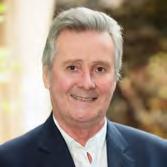
As i welcome all of you to this Autumn issue of our magazine, I must first applaud the tireless efforts of all of the School’s staff and pupils during the last six months. Online learning programmes and many other activities, including the amazing virtual King’s Week, using “Zoom” and “Teams,” have kept the heart and soul of the School as strong as ever.
Lately, OKS and everyone sympathetic to the School must be grateful to the Headmaster and all academic, Bursarial and Works staff who have held the institution together in this time of difficulty. It can’t have been any fun.
Meantime, our committee has lost its Executive Editor, as Elaine Lynch moves to the full-time post of Assistant Registrar at Junior King’s. She and design consultant Nick Ebdon have made a superb job of enriching and redefining this publication. She will be very much missed, but our loss is (we believe) JKS’ gain.
 Stephen Woodley
Stephen Woodley
Cover: metal artisan, Moradabad, India
Stephen Woodley’s mask courtesy of past President Charlotte Pragnell (MT 1988-90)
Although in-person OKS events have not been possible, we have launched new Careers and Networking activities, including King’s talks on Zoom and an online Q&A session for 6b pupils in preparation for university life. We are also delighted that Lizzie Bird has joined the OKS Association Committee as our representative for Careers and Networking. We look forward to announcing further initiatives soon.
As King’s has, over the years, diversified its pupil community and international appeal, we are now
seeking to appoint a Vice President for Diversity to our OKS Committee. A role description is available from oks@kings-school.co.uk. And to celebrate the racial diversity of our OKS, we are also appointing additional reps, including to start with: Jennifer Mbu for British Africans and Sage Battle for South Africa and New York.
We all hope that ‘in-person’ activities can resume before very much longer, but in the meantime we will continue to make the best possible use of the online tools at our disposal. And last, but by no means least, I would like to say a big thank you to Elaine Lynch for all her excellent work for the OKS Association, and wish her well in her new role, down the road, at JKS.
 David Peters
David Peters
2 OKS | AuTuMN 2020
OKS mAGAZInE • № 6 • Autumn 2020
In this issue
From the Headmaster
Since february, your school has been managing educational, health and operational challenges the like of which King’s has not experienced since the wartime evacuation to Carlyon Bay. I am so proud of the response – positive, upbeat and creative – from every pupil and from across the staff body.
King’s is at heart defined by being the School of Canterbury Cathedral. Our response to Covid-19 has been centred on the force and hidden powers of love, empathy, support, encouragement and humility, realising that many are much more affected than we are ourselves. In this way, it has been revitalising for our community, but has also become a source of comfort for others.
Our Summer Term and King’s Week (Virtually King’s Week) were unprecedented moments of innovation, flexibility and skill from the staff, as we launched King’s Education Online so that pupils at home could access their classes and many of their activities throughout the term.
Since September, for these last six weeks, King’s has not only been continually in session – nearly full attendance and Covid-19 safe thanks to a massive logistical operation and undaunted staff support – but we have had year group (‘the bubbles’) cross country at Birley’s, socials in ‘Chums’ (the Pupil Social Centre) with masks and pints of beer, and wonderful King’s talks on Microsoft Teams (some of them generously delivered by OKS, like Nathan Hudson-Peacock).
Bravo to all! We all desperately want to remain in session through to Christmas, but we do need a rest before we resume in November after the Half Term break. Please may I add my thanks to Millie Roberts, Jenny Mbu and many other OKS who have been so helpful and proactive in ensuring that the King’s response to #BlackLivesMatter has been excellent?

Peter Roberts

4 news from King’s: Skeletons and Cabin Fever
14, 22, 30 & 40 Features: An eclectic mix of OKS
10 Development news: Perils, Predictions & Plant Disease
18 OKS Overseas: Ghosts and Guardian Angels
26 OKS network: Cultivating opportunities
28 King’s talks: From climate change to Covid
32 OKS update: News of OKS around the world
42 unknown OKS: Speech Day Preacher
44 Lives Remembered: Obituaries
52 Sport: Shout outs from our sports teams
We want to hear your news and so do your fellow OKS.
Fill in the form on the address sheet or contact molly Burgess
telephone 01227 595669
email oks@kings-school.co.uk
website www.oks.org.uk
facebook.com/groups/oksassociation twitter.com/OKSAssociation linkedin.com/groups/35681 instagram.com/oksassociation
The OKS Magazine is produced by an editorial committee chaired by Felicity Lyons (SH 197577). The Senior Editor is Stephen Woodley (CR 1969-98) and the Executive Editor was Elaine Lynch. They are assisted by Peter Henderson (School Archivist, CR 1969- ), molly Burgess (OKS Coordinator) and Susan tingle (Development Office). Unless otherwise credited, photographs are by Matt McArdle or from the school archives.
3 OKS | AuTuMN 2020
News from King’s

KInG’S EDuCAtIOn OnLInE
Towards the end of the Lent Term the School shifted to online lessons as pupils began to leave Canterbury. For the Summer Term the Shells, Removes and 6b had a programme that was as close to normal as possible. In the absence of public exams the Fifths had a timetable based on their A level subject choices, studying three, four or five subjects, and 6a could choose from a variety of Pre-University Extension Courses. In addition, morning assemblies continued as did Sunday services. Many music lessons and some Activities carried on and so did Talks, with the opportunity for the ‘audience’ to ask questions. Houses still operated, as virtual communities. The Precincts may have been empty, but the School continued.
VIRtuALLY KInG’S WEEK
SPEECH DAY

An online ‘King’s Week’ took place on Wednesday and Thursday 1 and 2 July, with 22 ‘live’ events and 47 other offerings. Most of these are still available to enjoy via the School website.
One highlight was undoubtedly the interview with Michael and Clare Morpurgo: ‘From King’s to Farms for City Children’. Michael recalled his schooldays, Clare spoke on the charity they established in 1976 and Michael read some of his recent writings before answering questions.
The wonders of modern technology allied to the skill of the musicians made possible performances of ‘Spem in Alium’, the Bach motet ‘O Jesu Christ meins Leben Licht’ and the farandole from Bizet’s L’Arlésienne suite, as well as jazz, ‘Songs from the Shows’ and other regular favourites. Art, drama, lectures, quizzes and much more added to the entertainment. There was an OKS section with photographs and reminders of past King’s Weeks.
The usual Speech Day events were missing, and instead there was a modified version of the final assembly. This included a sermon from the intended Commemoration preacher Stephen Conway, Bishop of Ely, speaking from outside his Cathedral. A list of names took the place of the prize giving – the winners received an electronic voucher to enable them to purchase their book. The Captain of School, Ben Helme, spoke eloquently of the experience of King’s under lockdown and there was a farewell to the leavers as their names were read out by housemasters and housemistresses. All was rounded off with the singing of ‘Jerusalem’.
FunDRAISInG AnD VOLuntEERInG
Grace Murray and Harry Coe organised a schoolwide ‘any type of exercise over a week’ challenge that raised over £4,500 (more than double their target) for the Charity of the Term – Hospice UK. House-based enterprises included Linacre’s virtual challenge to get to Paris and complete the marathon there on 5 April: 236.2 miles in total. In the event boys, staff and friends cycled, walked and paddled 771.68 miles, raising over £1,800 for Porchlight, the homeless charity. Then, over halfterm, Jervis set themselves the task of walking, jogging and running 300km, raising nearly
4 OKS | AuTuMN 2020
nEWS FROm KInG’S

£1,500 for Women’s Aid. In July eight Remove boys cycled 100 km around the Kent coast from Herne Bay to St Mary’s Bay and collected over £2,000 for the NHS.
Director of Music Will Bersey and his son Henry, a Music Scholar in Mitchinson’s, put on ‘Cabin Fever’ on Monday evenings. Their online jazz performances raised over £500 for the NHS. Chaplain Martin Robbins worked at St Thomas’s Hospital during the Easter holidays. Matthew Rolison and the Design and Technology Department used their 3D printers to produce face shields for the Kent and Canterbury Hospital.
mInt YARD DIG
Canterbury Archaeological Trust has been excavating an area of the Mint Yard to the north of the former Mitchinson’s. In 1979 the Trust was able to investigate the foundations of the Almonry Chapel, as well as some Roman remains. This time the Roman road has been of particular interest and finds included a 4th century skeleton that might well have been from a victim of plague. A medieval stone-lined well and several rubbish pits were found, the latter including the vertebrae of a small
Photos, clockwise from top-left: a ‘resting’ Green Court; Matthew’s children putting the visors together in D&T department; Common Room; a cetacean vertebra (photo © Canterbury Archaeological Trust); Ben Helme
cetacean (possibly a porpoise) and the shoulder blade of a crane. Also examined was the paleochannel in the eastern half of the site, probably formed at the end of the last glaciation some 15,000 years ago. It is hoped that a full report of both digs will be published in due course.
COmmOn ROOm
Headmaster Peter Roberts pays tribute to this summer’s leavers.
Amongst those who have left King’s for welldeserved retirement, or to seek pastures new, are a group where the excellence in their teaching and the passion for their subject have made their names redolent to the Departments they have served so long and so well: Martin Miles for Modern Languages, Stephen Matthews for Music, Janet Taylor for Classics, Dave Scott for Chemistry, Peter Cordeaux for Art and Jim Dickson for Mathematics.


Others, though great subject teachers, will be remembered as well for particular gifts: Martin Franks as a legendary tutor in Marlowe, Owen Moelwyn-Hughes for developing the King’s Talks into a major part of evening cultural life for pupils and staff alike, Gill Moorcroft in helping the Learning Enhancement Department to become a ‘hub’ at the centre of the School, Kate Abbott (OKS), who has been an outstanding Senior Nurse, masterminding with Tanya Lee the creation of our new Health Centre in Almonry House, and Christina Astin who has shaped up in such an effective and exciting way our extensive Partnerships programme.
As Headmaster, I also salute the excellent allround contribution given by Sophie Rajska, particularly to the success of recent King’s Weeks, Lucy Jones, Annie Loveday, Tom Gooderham, Will Flint, Ling Kelly, Charlie Chester, who has helped the Economics Department grow in numbers and enjoy much success, Ben Pennells, who has been appointed Deputy Head at St
5 OKS | AuTuMN 2020
nEWS FROm KInG’S
Lawrence College after a great stint as Head of MFL, Linley Portsmouth, Fleur Mountjoy, Sue Kerridge, Pam Brown, Juliet Wright, Susie Rowe, Jen Wilson, Jess Potter (OKS) and Jo Child.
We have been wonderfully served by the pastoral insight and warmth of support for the pupils from matrons Claire Slater, Candy Woodgate, Amelia Arvidsson and Amanda Tapp. Jolindi Jefferson made a fine contribution as the expert physio at Birley’s and Blore’s; Paula Williams was superbly organised and expert in giving UCAS support and guidance to hundreds of King’s pupils each autumn; and Ali Huntrods was
dedicated and inspirational running the King’s Society for our parents.
As we successfully and with great heart embark on the new Academic Year, undaunted (‘invicti’) by the Covid-19 context, the following have taken up exciting new appointments: Matt Browning Head of Classics, Claire Anderson Head of History, Hester Davies Head of Modern Languages, Greg Swinford Head of Academic Music, Jonathan Pope Head of Economics, Geoff Nelson heading up Science Research as we work through the new Science build and David Perkins who will cultivate the arts to keep up the King’s renaissance balance.
VIRtuALLY KInG’S WEEK
King’s Week Manager Robert Sanderson looks back on the challenges and satisfactions of the 2020 Week
the focus for king’s week has always been to give current pupils the opportunities to perform, present and create in front of a large audience, to develop their skills of planning and organisation, and to grow in confidence. With the inability to conduct King’s Week as normal we were set the challenge to meet these ideals whilst swapping the physical stage for the online stage. A sense of community is paramount to the success of any King’s Week, and in the face of adversity nothing brings people closer together than an exciting project. In the end, over 500 pupils became involved by contributing to online events, broadcasts or competitions.

Filming the Highlights videos involved seeking special permission to access The Precincts, and deciding on which events would be accessible to the world and which would only be accessible to the school community involved some tough choices. Being able to create a timetable of
première released material over the two days added a sense of excitement and real-time participation to the festival; including live interviews with pupils, staff and Sir Michael Morpurgo, allowing the global audience to interact with each other; as well as numerous drama sketches and a highly polished art exhibition –not to mention the live quizzes.
The biggest challenge was probably the editing of the many music performances that required split-screen technology, lip-synching and much rehearsal to produce extraordinarily professionalstandard finished products – such as Spem in Alium which received great praise on BBC Radio 3 as being ‘one of the best things’ the presenter had heard that week.
In the end we did our best – we offered a bookend to the year and a window to the amazing talent that our pupils continue to display. This wasn’t exactly King’s Week as I knew it, but it was Virtually King’s Week.
Left: filming the Virtually King’s Week highlights show
6 OKS | AuTuMN 2020
nEWS FROm KInG’S
COVID-19 in historical perspective
Peter Henderson, the School Archivist, wrote this piece in April in response to enquiries about previous School closures
It is always tempting to suppose that the latest crisis is unprecedented in its nature and its seriousness. Yet while the details of the current virus and the response to it are new, this is certainly not the first time that the King’s School and the Cathedral Precincts have been forced to take severe measures to deal with disease or other disasters.
In the later Middle Ages the plague was an ever present threat. The devastating consequences of the Black Death are well known and further outbreaks were common. For example the History of Canterbury Cathedral records: “Between 15 July and 25 September 1457, during the most serious Christ Church ‘mortality crisis’ of the fifteenth century, fourteen monks died of plague.” There are no records of the medieval school to indicate the consequences for Canterbury schoolboys.
The plague was certainly a problem for the post-Reformation School. In 1575, the Cathedral Chapter Act Book noted:
Imprimis because the plague is already begun in the city of Canterbury, and therefore feared lest by accesse of scholars oute of the city into our Schole hereof might grow, yt is therefore agreed that the scole shall break up, and that the schollers shall have liberty, & repayre to their frends until the first of September next and that the scholemaster, Usher, and schollers be warnyd to be here present at that first September upon payne of their loss of their place and revenues.
In the 1630s there was an outbreak of smallpox. Some of the scholars left and one, Edward Fox, is known to have died. Then in 1637 there was a “dangerous scattering of the Plague amongst ye Flemish, especially about Northgate”. In a memorandum the Vice Dean recorded: “[10 July] I dissolved the School for so many as had
lodged without the Church… [21 July] I nayled up ye Great Posterne…” Finally on 16 September, the Dean and three of the Canons ordered that “our solemn Cathedrale prayers should be discontinued for a time… induced thereunto by the greate danger both of our Church and in the City, by example of ye Church of Westminster…”
The Civil War and Commonwealth had a severe effect on Cathedral and School. In 1641 the House of Commons resolved that deans and chapters should be ‘utterly abolished’, but this was not effected in legislation until 1649. In the interim the process of sequestration and confiscation undermined much Cathedral activity and the last recorded list of King’s Scholars dates from Michaelmas 1642. The School was lucky in that money continued to be paid by the sequestrator Thomas Monins, though at the Restoration both masters and scholars were expelled and the School began anew in 1660.
The ‘Great Plague’ of 1665 is mentioned in the ‘Book of Speeches’ compiled in the time of Headmaster George Lovejoy. The opening page records the prologue spoken on the 5 November speech day in 1665, which criticised the fact that some parents kept their sons away. It would seem however that one boy was later taken ill and placed in isolation in a tent erected on the Dane John, with his food delivered by a maidservant. Despite these measures, he still died after twelve days.
The School entry book started by Osmund Beauvoir in 1750 sometimes recorded the death of a pupil from a specific disease. Thus John Goatley Butler (aged 9) died of smallpox in 1754. Then in 1775 George Robert Berkeley (aged 8) and William Tatton (aged 11) died of a “putrid fever” just a week apart. Both were sons of Cathedral Canons, and Robert (as he was called) was the
7 OKS | AuTuMN 2020 OKS FEAtuRE

grandson of the famous Bishop Berkeley while William was the grandson of the late Dean (and OKS) John Lynch. Conversely a few years earlier in April 1753 William Windsor Fitz-Thomas “came from Eaton during the suspicion of a contagious fever there” but returned to Eton four weeks later.
This sad tale continued into the nineteenth century. In 1843 Augustus George Turmine, son of an OKS, died of scarlet fever at Mrs Morris’s house in Castle Street where he boarded. Then in 1854 George Baker White, whose father and both grandfathers were OKS, died of an unspecified fever. There is a memorial to him in St Stephen’s Church.
Disease remained a problem in the early twentieth century. Several notes sent by Headmasters to parents can be found in the Archives. Between 1911 and 1932 these referred to: measles (4), mumps (2), scarlet fever (2), rubella and chicken pox, and influenza – a list that is likely to be incomplete. The Spanish flu
a dangerous scattering of the Plague
epidemic arrived in the Michaelmas Term of 1918 and there were “less than twenty members of the School who did not succumb to it”. However, “thanks to the careful attention and nursing which the sufferers received there were no serious cases”. In 1931 it was the Captain of Boats Alan Barrett who had the measles. He recovered and went on to win a silver medal in the coxless four at the Berlin Olympics of 1936.
Most dramatic in its impact was the outbreak of scarlet fever in July 1928. Speech Day arrangements were cancelled at the last moment, and, as The Cantuarian put it, “the term came to an abrupt and undignified end”. A Prize Giving was held in the Schoolroom during the morning, and the Headmaster Norman Birley spoke to the boys: “This is a sad ending to a term which has been on the whole a good one… And remember that if anyone feels unwell it is his duty to report at once, and not carry scarlet fever germs all over the country.”
Though health scares generally subsided
8 OKS | AuTuMN 2020

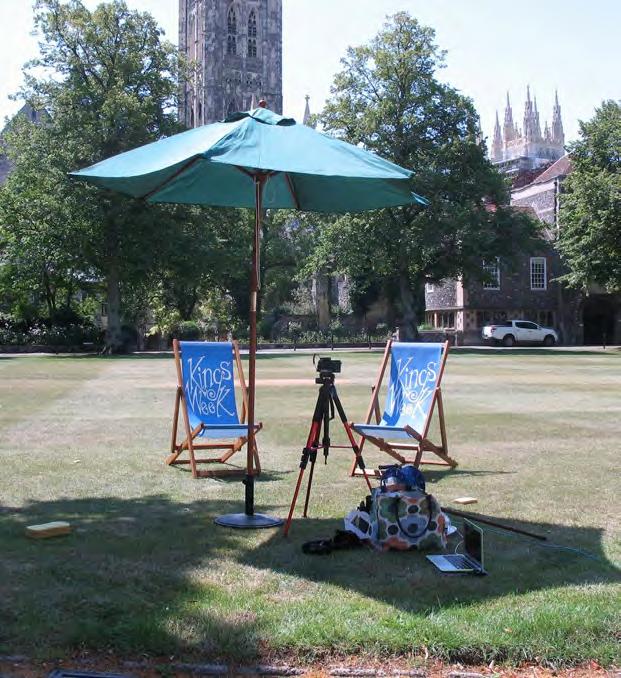
thereafter, there was the occasional epidemic. The 1957 outbreak of ‘Asian flu’ was particularly serious. In Great Britain at least 9 million had the disease and about 14,000 people died. Despite ten days’ extra holiday at King’s 416 boys were affected – 65% of all pupils. Lattergate with 92% was worst hit; Marlowe (53%) survived best. Riversleigh (a waiting house in the London Road) and Luxmoore (then in the New Dover Road) became temporary sanatoriums. The staff were relatively unaffected and lessons continued for those still standing.
Meanwhile there were other disruptions to school life. The greatest of these, of course, was the evacuation to Cornwall from 1940 to 1945. This was a necessary and wise move as the 1942 Canterbury blitz hit several school buildings – including the dining hall and the Headmaster’s house – as well as destroying a quarter of the city centre.
Even the weather could turn nasty. The winters of 1946-7 and 1962-3 were two of the worst on record. The 1947 hockey season almost
Opposite page: the dining hall: bombed in 1942, rebuilt after 1945
Left: 1928: Speech Day cancelled
Right: 2020: Wot! No marquee? A virtual King’s Week
entirely vanished, though there was some compensation in skating and ice hockey at Fordwich. Classrooms were very cold and boys wore overcoats and gloves in an attempt to keep warm. There were times when “the crossing of the Green Court was a bit of an adventure”. 1963 was similar: “the weather for the first half of term ruined all hope of any sport – apart from skating and snowballing – and made life unbearable indoors, thanks to frozen pipes and electricity cuts”. And then the three day week in the Lent Term of 1974 meant regular power cuts and lessons in classrooms lit with hurricane lamps. Near the end of term about 100 boys were struck down by the flu. However, “to the disappointment of many” term did not end early.
If there is a positive conclusion to draw from this brief account, it must be that the School, and the Cathedral, and the country survived and life carried on. Perhaps, as in 1575, “scholemaster, Usher, and schollers [shall] be warnyd to be here present at that first [or eighth] September” – if not sooner. Let us hope so.
9 OKS | AuTuMN 2020
Development News

Pandemics: Perils, Predictions & Plant Disease
As King’s continues to push ahead with the construction of the new Science building, Professor Sarah Gurr (SH 1974-76), a member of the King’s Foundation Board, muses on the importance of inspirational science teaching and on developments in her own field of science.
Our awareness of plagues and their impact on civilisation has heightened over recent months. This cruel awakening has focused our attention perhaps more than ever on the critical importance of science. As a scientist myself, I applaud the fact that King’s remains committed to its vision, with construction of the new Science building continuing, despite the crisis. I believe it would not be over-dramatic to say that top-class science teaching will be essential to the future of humanity.
My own journey into science began at King’s and I owe much to the encouragement of my biology teacher “Wilkie”, to my housemaster John B Sugden, and to Headmaster Peter Pilkington. Between them, they gave me the confidence to follow my dream of becoming a “Plant Doctor”.
And now, while the world battles with a pathogen to humans, plant scientists like myself continue to focus on plant diseases which pose an equally serious threat to our future.
I believe it is timely to raise awareness of the threat posed by pandemic plant disease. Human diseases may come and go, wreaking havoc with each pandemic, but the challenge of feeding an ever-growing global population remains. So, securing our food supply is of paramount importance, and more attention must be given to the threat from pathogens competing with us for our own crops.
Over the past centuries crop diseases have led to starvation, ruination of economies and the downfall of governments. Of the various challenges, the threat to plants of fungal infection outstrips that posed by bacterial and viral diseases combined. Indeed, fungal diseases have been increasing in severity and scale since the mid-20th century and now pose a serious threat to global food security and ecosystem health.
We face a future blighted by known adversaries, by new variants of old foes and by new diseases. Modern agricultural intensification practices, heralded by the Green Revolution, have heightened the challenge. Here, the planting of
10 OKS | AuTuMN 2020
vast swathes of genetically uniform crops, guarded by one or two inbred resistance (R) genes, and the use of single target site antifungals has hastened the emergence of aggressive, new fungal strains. Indeed, we now face the “double jeopardy” of a cross-over from crops to the clinic – meaning that fungicide resistant strains that emerged in the field are now causing mortality in patients who can no longer be treated with the same anti-fungals.

Climate change compounds the saga as we see altered disease demographics. Pathogens are moving poleward in a warming world. Our work thus concerns some current notable and persistent fungal diseases of both calorie crops (wheat and rice) and commodity crops (bananas and coffee). It considers the evolutionary drivers which underpin the emergence of new diseases and man-made “accelerators” of spread.
Our research is truly interdisciplinary – for it combines molecular and cellular biology studies on the fungi per se with host infection data, set in the context of environmental parameters which drive disease (such as data from the Meteorological Office) into complex meta-analyses. These models have shown the current and predictive global distributions of crop pathogens; as well as producing models for specific diseases on wheat, coffee and soybeans. Such work has led to more timely disease intervention strategies.
But not all is doom and gloom for we have recently also exploited our knowledge of fungal biology to design a new antifungal chemistry.
As the Covid pandemic continues to unfold, I will continue to encourage the School to keep the faith with its ambitious science development and I will bang the drum for support for what I consider to be one of the School’s most important developments ever.
Opposite page: a light and spacious Physics lab
Above: the Science Auditorium in the new Physics Building
Right: Prof Sarah Gurr, with group member Dr Will Kay, inspecting Panama disease symptoms on banana plants
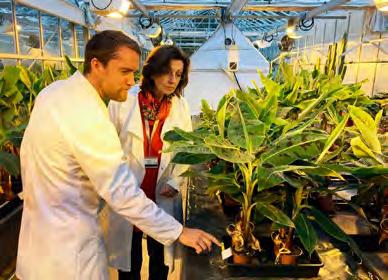
Sarah Gurr, plant doctor
SPlease visit supportingkings .co.uk for more information about the science development
arah gurr served on the Board of Governors for ten years. She was inspired to become a “Plant Doctor” by two books she found in the Biology library – The Advance of the Fungi (EC Large) and The Great Hunger, a social history of the Irish Potato Famine (Cecil Woodham-Smith). She studied at Imperial College (BSc, PhD), was a post-doctoral fellow at St Andrews, thence Royal Society University Research Fellow, Lecturer and then Professor at Oxford and Fellow of Somerville College. She was appointed to the Chair in Food Security, Exeter University in 2013. She holds several honorary chairs, doctorates and national and international fellowships, and has advised UK, Canadian and Indian Governments. Sarah was listed amongst the most highlycited researchers worldwide in 2019.
11 OKS | AuTuMN 2020
For more information on bursary giving please contact Deputy Development Director, Susan tingle
srt@ kings-school.co.uk 01227 595567
Bursary and After
Bursary recipient Charlotte Hurton (BY 2011-13) tells us how the award changed her life – but not in the way she expected.
Iattended king’s for my Sixth Form education as an Honorary King’s Scholar. After King’s and a gap year working with refugees in Canterbury, I went on to study Philosophy and Social Anthropology at the University of St Andrews. I am now on my last placement on the prestigious Civil Service Fast Stream graduate programme. I’ve worked on gender policy for the Home Office, Brexit and Covid-19 communications responses for DWP and am now in Adult Social Care policy at the Department of Health and Social Care.

My life and career would have been very different if I hadn’t received a means-tested bursary
covering 100% of the School’s fees. I came to King’s from an all-girls’ grammar school in Kent with a traditional view of what ‘success’ looked like. I was good at science and therefore wanted to study medicine. I applied to King’s believing the opportunity I’d have there would improve the quality of my education and increase my chances of becoming a doctor and being ‘successful’. Having grown up surrounded by an encouraging narrative of social mobility, studying at King’s would, my theory was, change my life.
King’s, and the bursary which took me there, did change my life – just not the way I expected when applying at 15.
What I found at King’s was an environment that afforded students the opportunity to be interested in anything and to pursue those interests regardless of the rigid criteria of ‘success’ I had previously known. At King’s, I found myself immersed in conversation and debate with so many different people with
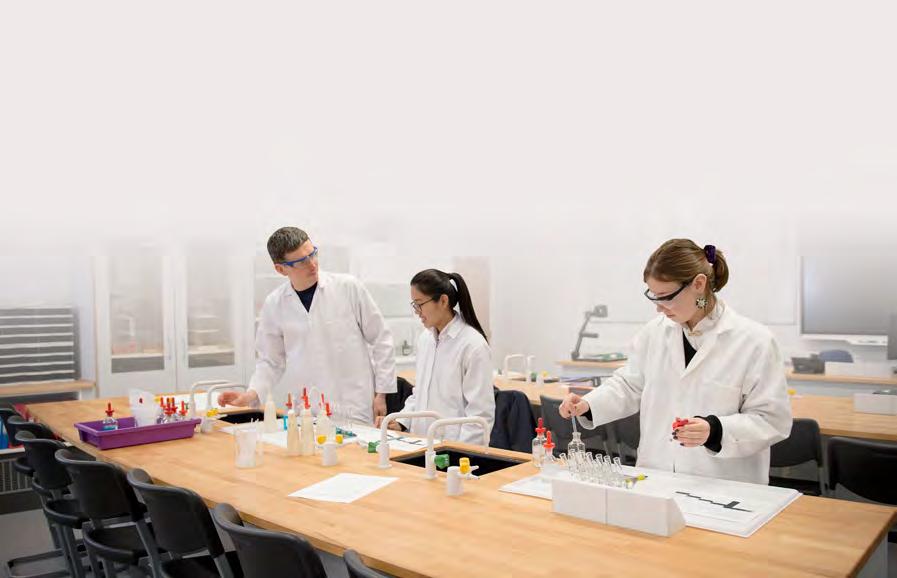 A KInG’S EDuCAtIOn IS tRAnSFORmAtIOnAL
A KInG’S EDuCAtIOn IS tRAnSFORmAtIOnAL
We believe that any pupil who can thrive here should be able to apply for a place with a real chance of benefiting from this life-changing advantage. We already offer means-tested financial support to pupils from a wide range of backgrounds. We provide this help against a backdrop of increasing costs and expensive legislation.
In contrast to many other leading independent schools, King’s is not blessed with a large, historic endowment, built on property or other assets.
We plan to increase the amount available to offer each year, so that we do not have to turn away talented and financially deserving pupils.
12 OKS | AuTuMN 2020
Right: Charlotte Hurton
DEVELOPmEnt nEWS
hugely different backgrounds to each other and, crucially, to myself. This ignited a passion and interest in people which I had never really had before. I took the bold decision at the beginning of my 6a year to abandon my plan to pursue medicine and to apply to study Philosophy and Social Anthropology. While others saw this as a risky decision, staff at King’s constantly supported me in my decision and my applications.
Studying Philosophy and Social Anthropology, I felt more fulfilled, motivated and happier than I could have imagined being studying medicine. Upon graduation, I joined the Civil Service, driven to dedicate my passion, knowledge and skills to society.
My bursary gave me an ability and strength to take charge of my future that I hadn’t felt before. A King’s education is unique, especially compared to my own state school experience, and I believe that no student with the drive to learn and discover their passions should miss out on that opportunity because of the circumstances of their birth.
Though King’s has certainly given more to me than I could ever give back, I believe that
Legacy Club
Adiversifying the School’s student population will benefit every pupil. Sharing diversity of experience is how we learn about the world around us, our position within it and how best to use that position for the good of all. I fondly remember one of my first conversations with a future good friend where she asked if I’d ever used a computer before, having come from a state school. I can only hope I brought a diversity of understanding to those I encountered at King’s.
I sincerely hope that bursaries can continue to be offered for many years to come, in the hope that others can benefit from the opportunities which changed the course of my life.
A bursary supports pupils while at King’s, but recipients of bursaries will continue to face challenges after King’s that some other pupils may not, such as navigating student finance support, the personal cost of unpaid internships and a narrower career network than some others. I would like to start an OKS network for bursary recipients, in the hope that the support of a network with similar experiences can help bursary recipients navigate life post-King’s. Please contact myself or Susan Tingle if you are interested in working together on this project.

huge thank you to members of the Legacy Club who have designated gifts in their will to be invested in the endowment or be spent immediately on bursary provision. These gifts have formed the bedrock of support for King’s over the past decade.
“King’s changed my life and I shall always be indebted to the School for the opportunities it opened up for me. Living in the shadow of Bell Harry, it somehow gave one’s faith a push and the confidence to believe in oneself. The Legacy Club is a small payback.”
Ivor Burt (SH 1943-48)
Generations from now, gifts from members will ensure that talented children, regardless of background, are given an opportunity to transform their lives.
“The endowment of education is King’s enduring legacy. To maintain it we need your help. Please join us; remember King’s.” Richard Ashworth (SH 1960-64) Legacy Club Chairman
• To find out more about including a gift in your will, joining the Legacy Club or ordering your badge, please contact our Deputy Director of Development Susan tingle srt@kings-school.co.uk / 01227 595567 or 07831 741455
13 OKS | AuTuMN 2020
DEVELOPmEnt nEWS
Left: King’s Legacy Club badge
OKS on the frontline
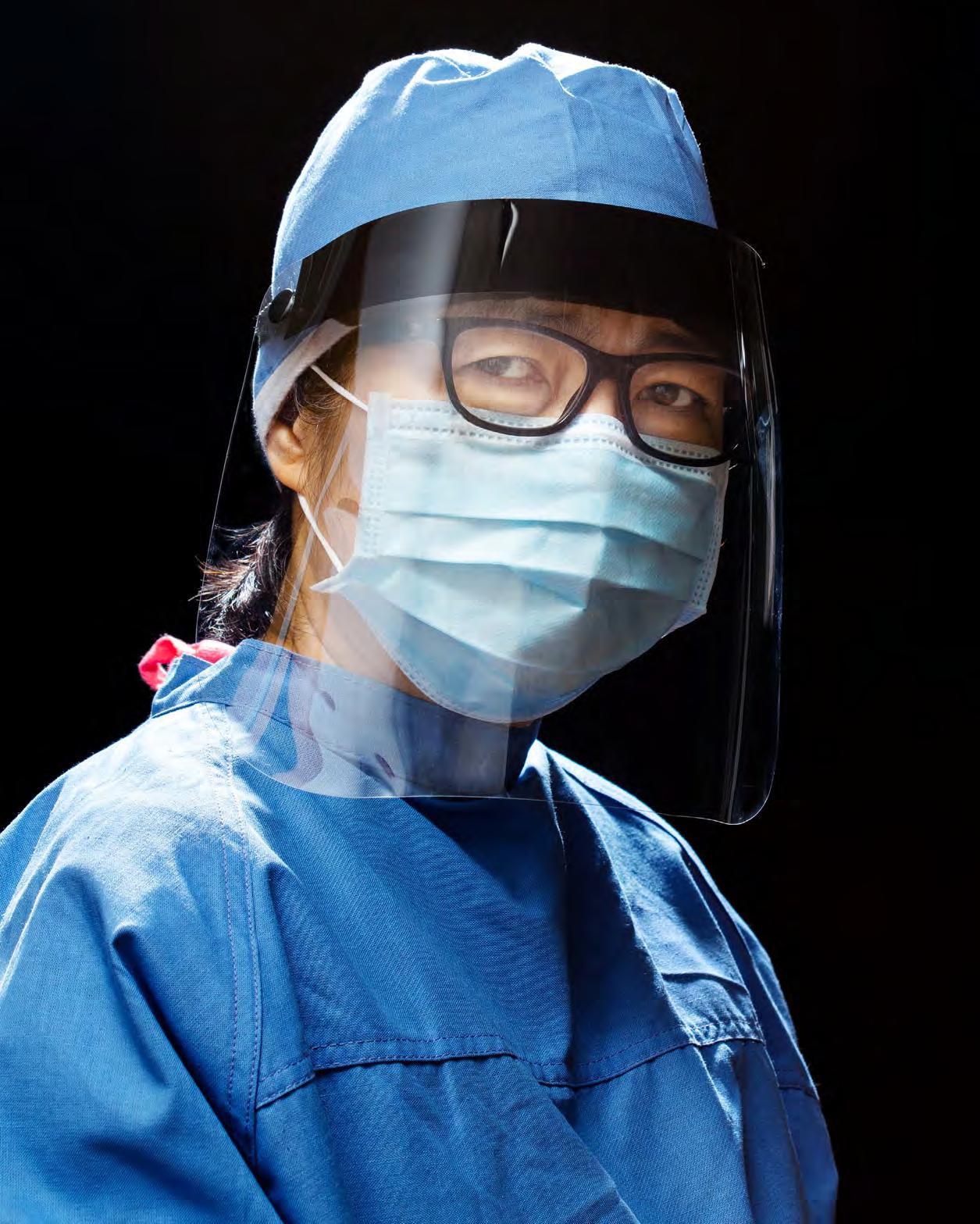
From volunteers to NHS heroes, five OKS tell us about their experience during the COVID-19 pandemic
14 OKS | AuTuMN 2020
OKS FEAtuRE

LInDSAY SHARP KInSEY (MT 1994-99)
Notary Public, Kent
As a public officer, Notarial work requires seeing every individual in person to verify that the execution of the document is valid and binding. Whilst much of the legal profession converted to remote working from home, Zoom calls or Microsoft Teams, this wasn’t an option for me. Suddenly at home, for the foreseeable future, home schooling my two daughters, I decided to swap suits and lippy for easy wash polo shirts and masks and a new era of Drive Thru Legal services was born.
It quickly became apparent that there was a need for Wills to be executed urgently for the high risk, elderly and key workers. Private client lawyers were working around the clock but home working had some logistical issues. A gazebo was put up, PPE sourced and I emailed all the local firms to offer my services in printing, sewing and witnessing Wills. The uptake was remarkable, anaesthetists suspending their retirement, junior doctors, nurses, care workers, cancer patients… we saw them all. To see the fear in their eyes and relief in sorting their affairs was such a moving and rewarding experience.
I tried to adapt my skills from sewing documents to sewing Scrubs with an amazing team of volunteers who provided a vast quantity to the NHS to meet their increased needs. However, as other countries came out of lockdown further
The country was preparing itself to support the weak and the elderly. It was hard not to want to be a part of it

matters became urgent and I found myself dealing with Court documents, drug patents and trade licences, companies restructuring and needing Powers of Attorney as Officers were stuck on the wrong continent and properties and vessels being bought and sold, one being a Cruise Ship! I never imagined an alfresco office would be so effective…
At a time when I had thought I would do some DIY and relax at home, I found I had never worked so hard. One thing I learnt for sure was that I couldn’t be a primary school teacher!

CHARLIE mEtCALFE
(SH 2011-14)
Junior Account Executive, London
Iwas at home in bed when Boris Johnson announced lockdown. My sister had been delivering food to my door in Brixton, and I was convalescing after two weeks of cold sweats. When my boss announced that the office was closing, I remember asking: ‘How long do you think it will be? A few weeks?’
By the end of March, Britain was in bad shape. But the country was preparing itself to support the weak and the elderly. It was hard not to want to be a part of it.
Working in PR, I noticed a problem that has now typified the government’s pandemic response:

15 OKS | AuTuMN 2020 15 Au
OKS FEAtuRE
bad communication. Important information was being dispelled across disparate channels and getting lost. People were confused.
The solution seemed simple: build a website to condense the information in one place. I called it The Pandemic Handbook.
With help from a few volunteers, we did just that. Scrubbing government websites and news articles for information became a daily chore. And we started a blog, Facebook group, and Instagram page to share the information. By May, each post was being viewed by over 3,000 people.
Now that the website is closed, I’m glad to have filled a gap that, at the time, felt needed. It was also a good exercise in project management, using skills that will without a doubt prove useful for future projects.
 umAR SHARIFF (MT
umAR SHARIFF (MT
1991-96)
Consultant Surgeon, Birmingham
The covid 19 pandemic led to unprecedented challenges for the NHS and has truly tested our resilience. At the end of March, all consultants in my trust moved to an emergency COVID oncall rota for the next two months. With all my planned surgical activity stopped, specific duties involved care of COVID patients on our surgical wards in addition to the usual provision
of emergency general surgical care. The intensive care teams and nursing/allied staff, in particular, deserve a huge amount of credit for their tireless dedication and care during the pandemic. Many contracted the virus and so staff shortages and exhaustion inevitably became the norm.
From June, new working patterns were introduced. Following repurposing of hospitals (four in our trust) to create “cold sites” for planned major surgery, I now carry out the vast majority of my operations (mainly for advanced cancers) in the independent sector (on NHS contracts) due to the necessity for cold intensive care facilities.
“…and there were no more surgeons, urologists, orthopaedists, we are only doctors who suddenly become part of a single team to face this tsunami that has overwhelmed us…”
Dr Daniele Macchine Bergamo, Italy
9 March 2020
The far-reaching impact of the pandemic cannot be underestimated. I chair our weekly bowel cancer MDT meeting and presentations of advanced, inoperable cancers are not uncommon. So I think the legacy of the COVID-19 pandemic will pose many challenging times ahead for our cancer teams and their patients...

CHIDERA OtA (BY 2010-12) Junior
Doctor, London
During the covid crisis, I was in my second foundation year, working as part of the general surgery team. Once the crisis began to peak, most elective, and even some emergency operations, were postponed to relieve
16 OKS | AuTuMN 2020
OKS FEAtuRE
pressure on the NHS. This meant most of the responsibilities attached to my job disappeared, and I was redeployed to ITU (Intensive Therapy Unit). I worked in North West London, an area particularly hit during the crisis. Moving to the unfamiliar environment of ITU as an inexperienced doctor was terrifying, particularly within the context of a novel virus that we had few treatment options for initially. The majority of my patients were sedated and intubated –this meant they couldn’t communicate their needs with me. It also meant they couldn’t communicate with their families, so this became a daily job, something I’d never had to do in quite this way before. Due to staff shortages, I had to learn to perform tasks normally considered outside my remit, whilst working a rota that was 50% night shifts.
Overall, though scary at times, the experience I gained during my time on ITU was invaluable. I’m grateful for the colleagues I met, patients I cared for, and the families I got to know so well during the crisis. I’m glad to be back on surgical ward however, and have my fingers crossed that we’ll avoid a second wave.

LARA OLSZOWSKA (WL 2010-15)
Masters Student and Tutor, London
Everyone can remember where they were that dreary evening on March 23rd when Boris Johnson finally announced that the UK was to enter into a strict lockdown with no known end date. What I remember in the following week was the gentle nudging from both of my parents for my siblings and I to make use of this time so that our memories of lockdown were not reduced to the day it was announced, the day it was lifted and some banana bread fuelled TikTok dances in between.
Enter TLC during Covid, a local initiative set up by an amazing couple called Julian and Maria Sturdy-Morton. After retiring, they set up a business called A Bit of TLC, which organises outings and day trips for senior citizens. When Covid hit, they saw the pandemic as
an opportunity to help those who were too vulnerable to do their shopping. Within the first two weeks of sending out a call for volunteers, they had over 100 of them. I was on the job from the start, along with my mum Veronica Olszowska (née Bircher, WL 1984-86) and my sister Zofia Olszowska (WL 2012-17). Together we watched this small delivery service grow from 20 to 120 orders in a week. The three of us even climbed through the ranks to become lead volunteers, which meant training newbies, getting in early for the fruit and veg delivery and leaving only after the packing stations had been set up for the next day.
Over 12 weeks of lockdown, time sometimes stood still but it never passed quicker than when we were packing boxes, chatting to the colleagues who became our friends. In March, I thought I’d signed up in order to save others from the dangers of Coronavirus, but I somehow ended up rather selfishly saving myself from the lack of purpose and lack of normality that characterised so much of our daily existence for those weeks.
17 OKS | AuTuMN 2020 17 Au
OKS FEAtuRE
OKS Overseas
The Hungry Ghost Festival in Singapore
Brian Sun (MO 1987-91) explores this living expression of culture and tradition.
The modern façade of Singapore exemplifies the typical traits of globalisation with the multi-dimensional presence of consumer brands and multinational corporations in this island metropolis. However, underneath the urban structure of this organised state, Singapore still retains some intriguing indigenous heritage that is expressed from its over-arching multiracial society.
The West is now well versed in the celebration of the Lunar Chinese New Year during Springtime. Little might be known of an indigenous Chinese tradition, known as the Hungry Ghost Festival, that is celebrated in Singapore and parts of East Asia during the 7th lunar month, around the Autumn season. The Hungry Ghost Festival, though unrelated, can be casually perceived as the Chinese version of Halloween or perhaps the Mexican culture ‘Dia de los Muertos’ (Day of the Dead): a season to demonstrate respect for deceased family members from past generations.
tales warn against venturing outdoors at night and against swimming during this season to frighten children into good behaviour. To appease these wandering spirits, modern Chinese Buddhist and Taoist families burn paper offerings of material replicas that are associated with the living world. It would be common to see paper models of iPhones, Mercedes cars, or Gucci handbags sold to families who practised the ritual customs of burning offerings to the deceased souls in return for peace and protection from bad luck. This unique cultural heritage passed down from generation to generation has become a living expression of culture and a reaffirmation of indigenous life amidst Singapore’s post-modern society.
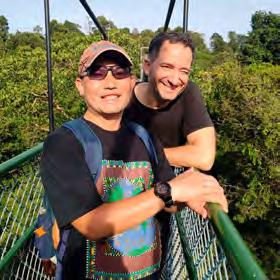
Dr Jonathan Marshall (LN 1982-87) described being amazed by the influence of the Hungry Ghosts while doing his obligatory 2½-year national service as a naval officer in Singapore. “I had no idea how seriously people took the festival until I was in the Navy. Friends who had previously never indicated any superstitious beliefs attributed everything from mechanical failures to odd noises to the ghosts. One of my most reliable colleagues – a midshipman who could withstand incredible stress and was always reliable – was reduced to a nervous wreck by the end of the month. He described seeing ghosts pursue and even try to suffocate him.”
In brief, the origins of the Hungry Ghost Festival stem from traditional Buddhist and Taoist beliefs in the rebirth of ancestors and the union of the local community. During the auspicious 7th lunar month, colloquial stories unfold that the Gates of Hell are opened to release lost souls to roam the living society where they seek food and entertainment. These ghosts are believed to be ancestors who were not accorded a ritualized funeral. Families who practise these religions would thus offer food and drink in rituals and light bonfires to burn paper replicas of Hell currency, cars, houses, mobile phones, clothes and most recently face masks to be received by these wandering ghosts. Folklore ‘boogieman’
I have fond childhood memories of sharing ghost stories with my primary school friends. Though aspects of the Hungry Ghost Festival might be superstitious, it forms cultural imprints associated with Singapore’s indigenous culture. Beyond my curiosity surrounding these customary traditions, I feel an overwhelming sense that such cultural traditions are becoming eroded by modernisation and the rising apathy of younger generations unwilling to practise such traditions.
As the global pandemic slows our fast-paced world, it is a serendipity to encounter these living expressions of culture and heritage.
18 OKS | AuTuMN 2020
Fundraising in The Philippines
From painting postcards to emergency food packages, Jasmine Barcelona (LX 2001-05) on her efforts to help frontliners in Santa Catalina.
Istarted painting a lot during lockdown in the Philippines, and one of my friends, Anna Broxup (LX 2000-05), had a brilliant suggestion: to turn one of my prints into postcards, as a way for people to let their loved ones know they were thinking of them. I painted a Guardian Angel nurse, and my sister Ainhoa and I started receiving donations in exchange for the cards.
We made relief food packages for frontliners, and also for families who had lost income due to Covid-19. As ‘no work, no pay’ is unfortunately common place here, this was particularly tough for farmers who couldn’t move their produce between closed borders, and those who’d been working in small businesses that were closed or suspended.
Now that people are back at work, it is the poorer children who are disproportionately affected; private schools have resumed, however state schools have been postponed until 5 October. With the ‘new norms’ looking to online schooling, these students who do not always have access to electricity or a laptop are likely to get left behind – so we have turned our support towards school supplies. With no end in sight to the pandemic, we have also started setting up sustainable livelihood projects, such as Cita’s Kitchen (@kusinanicita), which is a family-run business where Cita cooks, her granddaughters manage the sales, and her son delivers by motorbike.


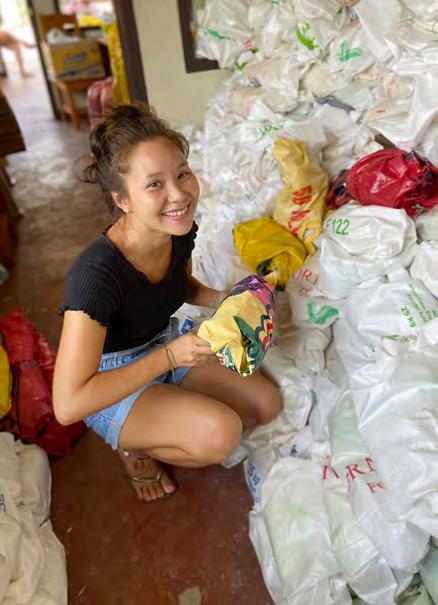

Opposite page: Brian Sun and co-writer Jonathan Marshall
To date, we have raised over £8,000 and delivered 2,350 food, clothing and school support packages to families in 17 neighbourhoods, which has been fantastic, and some donors have also contributed separately for specific projects. People have been hugely generous,
This page: Jasmine preparing support packages and army guards holding the Guardian Angel painting
it’s really heartwarming, and they have helped us spread the word through social media and live interviews on BBC World and Sky News. It has also been an amazing way to bring people together during Covid-19, and has also been a lot of fun. Thank you to everyone, including a fair few OKS for all of your support.
• Please search for santacatalinacovid19 on Justgiving.com to join the cause and donate.
19 OKS | AuTuMN 2020
OKS OVERSEAS
Overseas Reps
With an increase in the number of overseas students at King’s over the years, it is important that we recognise that the OKS Association is an international organisation. To celebrate and champion the diversity of our members, we have recruited additional overseas representatives. Eunice Chan is our second representative in Hong Kong – a country with a large, close-knit King’s community. Sage Battle

Sage Battle (BY 2015-17)
South Africa & New York
i am an aspiring Visual Anthropologist, currently finishing off my Bachelor’s in Theology and Anthropology at the University of Stellenbosch, South Africa. I take inspiration from the world around me and have been closely documenting the human condition in the USA, the UK and South Africa. I am currently on the organizational board for TEDxStellenbosch, as I am a firm believer in global citizenry and creative outlets of expression. In addition to this, I have recently been marketing indie films.
I am constantly between NYC and Cape Town. Whether it be for travel advice or to grab a coffee with a fellow OKS, I am keen to touch base.
has become the representative for New York and South Africa where she is currently at University. We are especially pleased to announce that Jennifer Mbu has taken up a new role as our African-British representative. Jennifer is looking forward to acting on behalf of black OKS in Britain.
We would love to recruit more overseas representatives, so please get in touch with the OKS Office if you would like more information about the role: oks@kings-school.co.uk

Jennifer Mbu (BR 2011-16)
African-Britain
since king’s, i went on to undertake my undergraduate degree in Theology and Religious Studies at the University of Nottingham. Upon graduating, I worked as an International Recruitment Consultant for a firm in London up until Covid-19 struck. In January 2021, I will be starting my MA Law degree at the University of Law.
The outbreak of Covid-19 and the intensity of the Black Lives Matter movement forced me into a place of reflection. This led me to want to revive my involvement with King’s and the OKS Association, to bring people together from different backgrounds and to share knowledge on racial issues within the UK.

Eunice Chan (BY 2015-17) Hong Kong
i have recently graduated from Cambridge Natural Sciences and will be joining the Life Sciences practice of L.E.K Consulting in London. Born and raised in Hong Kong, I joined King’s in sixth form and it was such a life-changing experience to come out of my comfort zone in Hong Kong. The most precious thing King’s gave me was a group of friends from extremely diverse backgrounds. I am still in touch with many of them and they have become some of my closest friends.
Although I will be based in London for now, Hong Kong will always be my home. It would be amazing to meet other fellow OKS and recall the good old times back at King’s.
We are currently looking for an OKS to join our Committee as OKS Vice-President (Diversity). The post-holder will help us to promote diversity within the OKS Association and maintain a network of OKS Representatives that accurately reflects our membership. It will be their objective to promote equality and flag discrimination within the organisation and the wider community.
If you are interested in the new role of OKS Vice-President (Diversity) please contact molly Burgess on oks@ kings-school.co.uk
20 OKS | AuTuMN 2020
OKS OVERSEAS
OKS Gift Collection
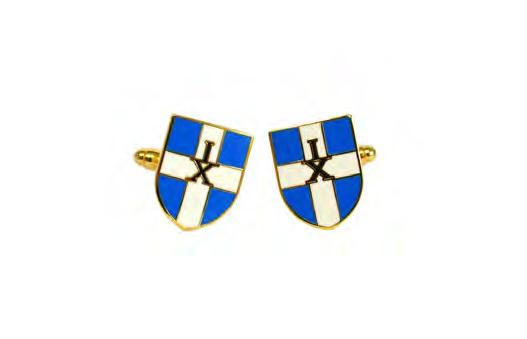
CuFFLInKS
King’s School cufflinks in the style of the school crest. OKS cufflinks are burgundy with a dark blue and silver stripe. Both sets of cufflinks are enamel and come in presentation boxes.
£28.00


OKS BADGE
The OKS enamel badge is proudly made in Britain by Royal Warrant holders Toye, Kenning & Spencer. This beautifully enamelled badge sits securely on suits or dresses with a double magnet. In the OKS colours of navy blue and burgundy. A Legacy Club badge is also available. Presented in a gift box.
£17.00
KInG’S SCHOOL muG
A china mug for tea or coffee drinkers. Every OKS home should have one.
£13.00
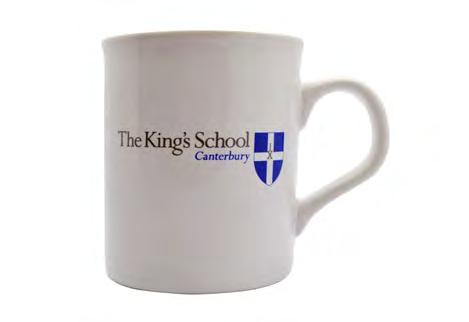
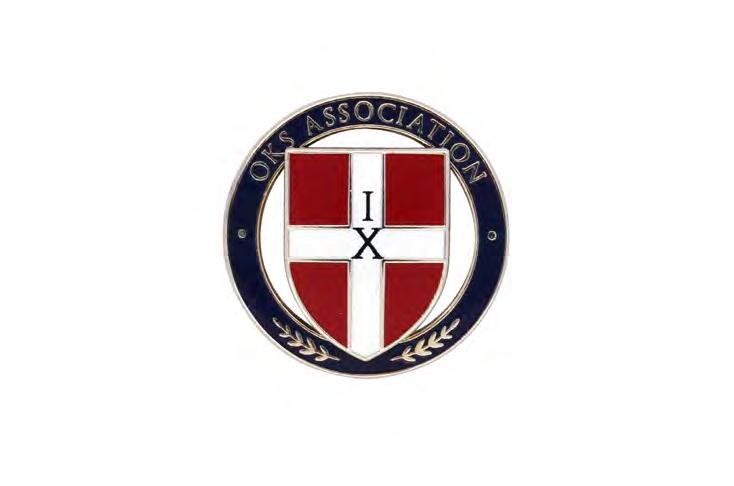
KInG’S SCHOOL tEDDY BEAR
Soft, cuddly and clothed in his very own King’s School jumper. The bear is looking for a home. We’ll leave the name up to you!
£17.00
You can order these items on the King’s School Box Office kings-school.co.uk/boxoffice or alternatively please contact the King’s School Shop on 01227 595551
All items include UK postage. To order items when living outside the UK please contact the School Shop.
OKS tIES
The OKS silk tie comes in burgundy with a navy and silver stripe. The OKS University silk ties come in Oxford and Cambridge colours. We also have an OKS bow tie available.
£30.50 (OKS)
£27.00 (Oxford and Cambridge)
£27.50 (Bow Tie)
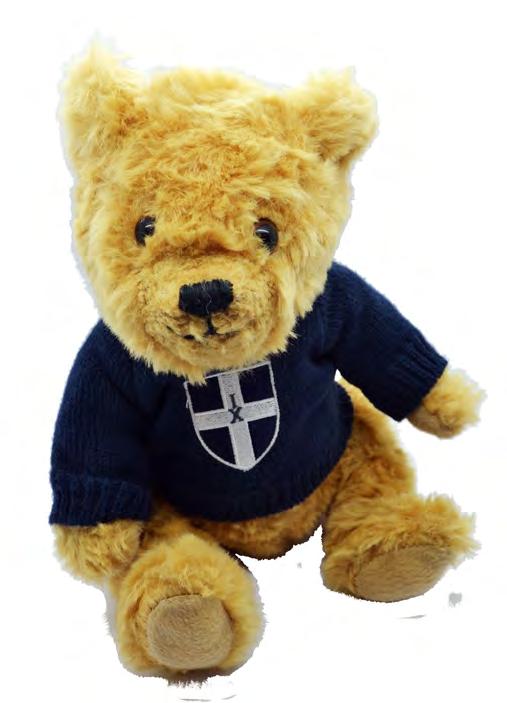
OKS | AuTuMN 2020
Shared Earth: fair trade, eco and ethical
Jeremy Piercy (GR 1967-71) looks back on nearly fifty years of helping to create a fairer and more sustainable world
Iwas at King’s from the age of 8 to 17 and left in 1971 having no idea about what my future might hold – solicitor? accountant? teacher? Wanting to see the world, I hitch-hiked to India. It was a shock to see how so many people lived, yet the poorest people seemed often the most willing to share what they had. In my career, I wanted to repay some of the hospitality I received by trying to address the inequalities of wealth in the world. Travelling to India also made me realise how much we waste in the UK, and I became passionate about recycling.
With the birth of the Fair Trade movement in the late 1970s, I opened a Fair Trade shop in York in 1986, and Shared Earth was born. A second shop followed in Leeds in 1988, and by 1992 we had shops in Bradford, Manchester and Birmingham.
At our height, we had nine shops around the UK. But the financial crisis of 2009-10 was disastrous. A huge loss in our Birmingham shop led to our main company going into administration.

We only just managed to hold on to our most successful shops, in York and Liverpool, the two that remain today.
Since 2010 sales have increased almost every year and we now have the widest range of Fair Trade and recycled products in Europe. Our customers love us because we provide something different, for example socks made from bamboo instead of cotton; hand-carved chess sets; gifts made from recycled bicycle chains, tins, saris, even oil-drums, computer boards and flip-flops.
Products with reduced environmental impact are increasingly in demand
In 1992 we started wholesaling, with recycled greetings cards and stationery printed in the UK. Today we buy from developing countries across the world. Our sales have increased by a third each year for the last 7 years; last year it was 42%. Our customers include zoos, museums, galleries, corner shops, internet outlets, wildlife centres and gift shops. We’re the main gift supplier for Oxfam, our largest customer.
We believe in a fairer world where people are
22 OKS | AuTuMN 2020
OKS FEAtuRE

not exploited, and a sustainable world where global warming and other environmental issues are tackled, not ignored. For a country to have strong labour rights, and then sell goods made by children or forced labour in India or Brazil, is a contradiction.
Business pundits might scoff at the relevance of such issues, but large companies increasingly insist that their suppliers are audited on social and ethical performance. Countries like Kenya which have banned single-use plastic bags are the voice of the future. Britain used to be the leader of the world; where is it now?
Global warming will not go away, and products with reduced environmental impact are increasingly in demand. We sell re-usable cups which are made from rice husks and no plastic, the type of product in tune with the public’s growing awareness that the environment matters. Even the Coronavirus crisis is being linked to the way we encroach on wildlife
Above: Fair Trade bodycare, India
Below: artisan making toy vehicles from recycled tins
habitats, opening ourselves up to pandemics.
I am passionate about my job and awakening our staff’s idealism is key to our success at Shared Earth. In the same way, our customers appreciate the fact that we’re not just trying to make money. They can feel that they’re not just buying a product, they’re buying something that will benefit others as well as themselves. This gives us a real edge over ‘normal’ gift shops.

Over the years I have travelled to many different countries, seeing how people live and work and meeting their families. Sometimes the friendships I’ve made get me into trouble. A friend in India, CEO of a Fair Trade export business in Mumbai, recently persuaded me to go on a marathon there, to raise funds for their projects in the Mumbai slums. I was in my early 50s and pretty unfit. Actually I only did a half marathon – but I remember thinking our PE teacher at JKS (whose initials were also PE) would have been very impressed. I hated cross-country running
23 OKS | AuTuMN 2020
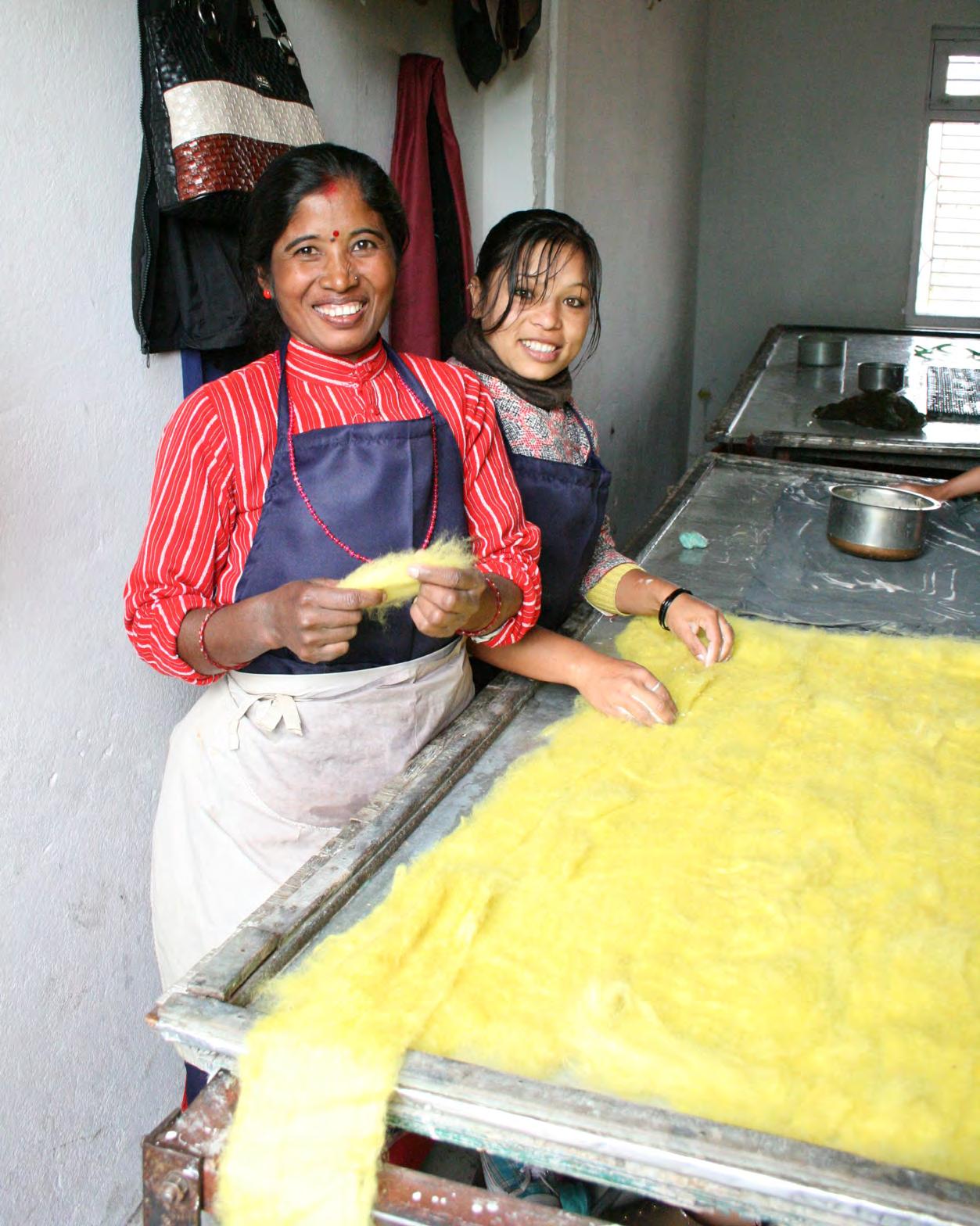
24 OKS | AuTuMN 2020
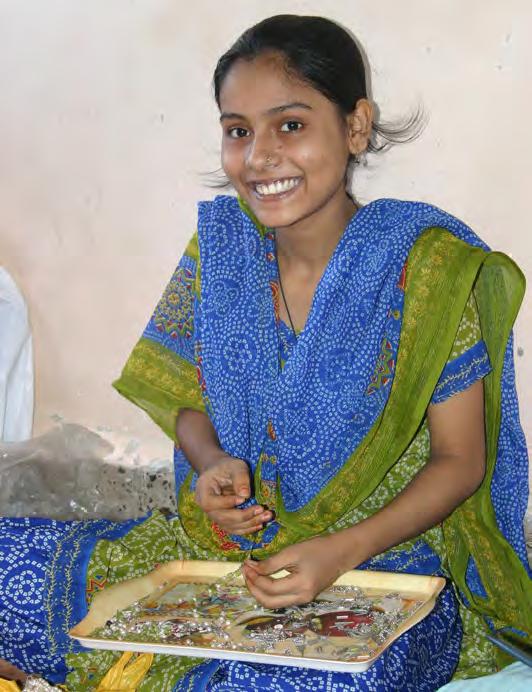
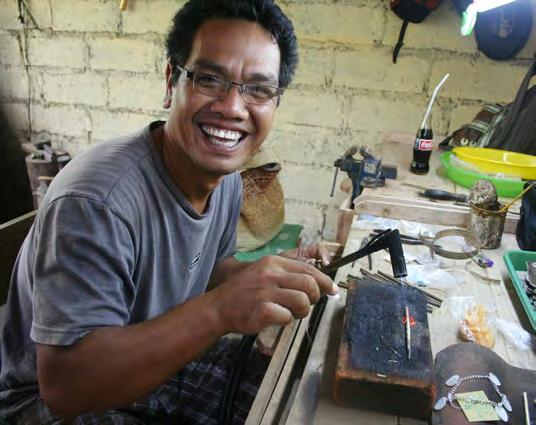


and usually came last or nearly last. I decided to record the various amusing incidents that happened on this trip for my children – my doctor for instance telling me when I went for inoculations that I’d come to the wrong person. I didn’t need a doctor, he said, I needed a psychiatrist. This turned into a book, a story of my life and the Fair Trade movement. I called it ‘Cats, Coffins and Fair Trade Sex Toys’ – cats because we sell so many of them, coffins because a friend runs a Fair Trade / eco-coffins business, and sex toys because – well someone was trying to promote Fair Trade condoms at the time, and I thought it would help sales...
Now, at age 66, I don’t actually want to retire. It’s a great achievement to find a job you really enjoy, far more important than your salary. I’m delighted that my two sons have joined the business; one is our Wholesale Director. My other key partner, our Accounts Director, left school at age 16 with no qualifications. After a long day at Shared Earth, he studied in the evenings until ten years later he became a fully qualified
Opposite page: Making handmade paper, Nepal
This page, clockwise from top-left: jewellery artisan in Mumbai, India; windchime artisan, Indonesia; bird houses made from recycled textiles; sustainable wood table and stools
accountant. Now he’s been with me for 25 years, a friend and invaluable to the business.
Of course the future can’t be predicted, and many businesses are struggling right now. But my commitment to environmental issues has paid dividends. Our use of sustainable raw materials, recycling, avoiding plastic, and selling products which promote biodiversity and wildlife, all seem to be what consumers are looking for. They’re trends which I think can only grow as the climate crisis gets worse and we realise we have to be really serious about tackling it.
• Shared Earth is one of the UK’s leading suppliers of Fair Trade, eco-friendly, recycled/re-made and ethical products, selling a wide range of gifts, home and fashion accessories, furnishings, jewellery and games.
sharedearth-trade.co.uk 01904 655314
25 OKS | AuTuMN 2020
OKS Network
OKS Careers and Networking: a new representative
A welcome from Elizabeth (Lizzie) Bird (LN/BY 1989-91).
From st mary’s School in Cambridge I joined King’s in 1989 at an interesting time which saw me experience the school with only 6th form girls as well as fully co-ed. I took English, History of Art and Geography A Levels, and went on to study Geography at University College, Durham, following a year out spent in Cambridge and Mexico.
Since graduating from Durham, I have predominantly worked in recruitment and talent management, having switched paths from stockbroking at Oppenheimer. My first in-house recruitment role was at Arthur D Little, where I was responsible for graduate and MBA recruitment within the UK. Upon leaving, I moved to a global project at Shell, which provided an excellent training ground for best practice recruitment. I subsequently set up my own business, Indigo Green Consulting Limited,
through which I focus on advising small to mid-size businesses on recruitment and talent, developing competency frameworks linked to culture and strategy, and training interviewers. I also support Executive Committees in assessing senior hires. I have just completed an extensive project at an investment management firm, Ruffer LLP, to overhaul completely their recruitment practices and have previously worked with firms in industries including Private Equity, Insurance, Oil and Gas and Management Consulting.
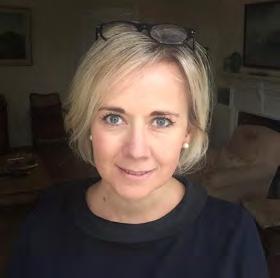
Having trained as a career coach, I have worked with top business schools in Europe, including London Business School and IESE, supporting students in identifying and securing jobs aligned with their values, skills and motivations.
I am absolutely delighted to take on the role of OKS Careers Rep. My experiences have taught me that careers are dynamic, evolving over time, and that tremendous value can be brought to individuals by sharing experiences, knowledge and perspectives at any stage. The OKS network brings an exceptional range of experience, and I am very much looking forward to cultivating more opportunities for OKS to share their career stories and insights.
University reunions
oxford university rep. Nick Curtis Oxford (GL 2012-17) organised a catch-up with OKS at the OXO Bar on Thursday 5 March 2020. Millie Butler-Gallie (LX 201318) has now taken over from Nick as the University Rep. for Oxford.
Pictured in the photograph, left to right, are: Emma Chaplin, Valerie So, Donghui Jia, Nick Curtis, George Palmer, Millie Butler-Gallie, Tofi Omisore.

26 OKS | AuTuMN 2020
OKS Online: A Virtual Q&A
Molly Burgess (OKS Coordinator) reflects on a unique 6b University Advice Day.
The summer term at King’s has truly been like no other. Usually, a week before King’s Week, we invite a number of OKS to talk to current 6b students about their experience at university on the Green Court. Of course, this could not quite happen under lockdown and so we took to Microsoft Teams to deliver a helpful Q&A session.
explained that your first year is the excellent opportunity to try something new and perhaps obscure. Although the Kendo Society wasn’t quite the society for him, it was a great chance to explore a different activity and meet new people.

Introduced by Al Holland (Head of Sixth Form), three OKS, Harry Trelawny-Vernon, Amber de Ruyt and Alex Choi, appeared in front of their webcams ready to answer questions submitted by 6bs.
The Q&A kicked off with Oxbridge-related questions for Amber (Cambridge) ranging from “What is the interview process like?” to the allimportant “How did you choose your college?” Harry (St. Andrews) emphasised the importance of maintaining a balance between university work and staying social. Through societies, he was able to find his crowd and make friends quickly. Expanding on this, Alex (London)
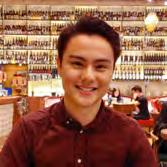
Alex Choi has started his second year studying Economics and Management at King’s College London
• The Q&A is available to watch on the Careers section of the OKS website
The video call ended with a discussion about online learning – a method of teaching that every student has quickly come to terms with. Despite the initial challenge, the OKS panellists reassured 6bs that their experience at university has not suffered as a result. As all three OKS stated: “With university, you get out what you put in.”
Thank you to Harry, Amber and Alex for giving such an in-depth and honest insight into university life.


Amber de Ruyt is in her second year studying Education at Cambridge University

Harry Trelawny-Vernon is going into his second year at St. Andrews University, a popular post-King’s destination
27 OKS | AuTuMN 2020 OKS nEtWORK
tHE OKS PAnEL
OKS at University: A
different kind of Freshers’ Week
Camilla Roberts (LX 2012-17), OKS university representative for Edinburgh, gives us an update.
The oks university network is growing fast and with reps all over the UK, it is great to reach some of the key OKS destinations. We have held a number of reunions in the past year and it is lovely to get together, take a break from studying and catch up with each other.
The last reunion was in March, organised by now-former Oxford rep Nick Curtis. Unfortunately, we haven’t been able to have any since, due to lockdown restrictions. COVID has
had an enormous impact on university life with limited face to face teaching meaning we all must become Zoom ‘experts’, far fewer extracurricular activities and limited social interactions in general. This year will be a new and daunting experience for all students.

New representatives for the academic year include Samuel Poole for Exeter, Kat Mangam for Warwick and Millie Butler-Gallie for Oxford. Upon discovering a strong OKS presence at St. Andrews, Mabel Pickering offered to become our first representative in Scotland.
I will be continuing as the representative for Edinburgh until I graduate in 2021. Elizabeth Guild will continue in Cambridge; Amelia Paine in Bristol – a destination that more OKS are choosing; and Tia Curtis in Durham – the last
OKS KInG’S tALKS ONLINE
King’s talks have a strong tradition. From political lectures to career talks, the School delivers a range of inspiring and interesting talks for pupils from experts in their field. The OKS Association has gained a regular slot for these talks and we are excited to be hosting OKS speakers via Zoom. Watch online: oks.org.uk/careers
Deserts, Mountains and COVID-19: Life as an Expedition Doctor
nathan Hudson-Peacock (MR 200510) talked about his experience as an NHS doctor during Covid-19 and his work as an Expedition Medic. He also shared some thoughts that might help us all cope in a world that is both simultaneously more connected and yet more isolated than ever before.

Facing Change: Can we grasp the promise in the peril?
Paddy Loughman (GL 1999-2004) works with the Climate Champions Office within the UK Government and UNFCCC, the Environmental Funders Network, the Wellbeing Economy Alliance and Green Economy Coalition, and his talk is adapted from one created for Extinction Rebellion.
For information on future talks, please visit the OKS website oks.org.uk/careers or if you would like to give a talk please get in touch: oks@kings-school.co.uk
28 OKS | AuTuMN 2020
OKS nEtWORK
Left to right: Amelia Paine, Mabel Pickering, Samuel Poole
reunion she held brought over 15 OKS together for the night. Alex Choi will continue in London and hopes to bring together OKS from the many different universities based there.

We even have a university rep in America. Simi Ayinde is based in Pennsylvania but is able to help any OKS thinking about studying in America. Studying abroad is a big decision, so it is helpful to hear from someone has made the move themselves. Simi has done lots of travelling during her time abroad so has lots of advice to give.

If you’re starting university this year, it’s important to remember that everyone is in the same boat. In some ways university life might be harder than normal but I also think that there
will be unforeseen advantages. Recorded lectures mean you can pause and rewind as much as you want (no more frantically scribbling down notes as lectures sweep through huge topics), restrictions on indoor activities and socialising mean we all have a better excuse to get out and explore the new (or not so new) cities we’re lucky to be residents in. (I can personally recommend pottery painting, beach trips or even hiking and camping if you’re really gung ho.)
And finally, even if friendships are harder to make, the ones that you do find will be much richer because of this shared and slightly bizarre experience. It’s more important than ever that people know they are part of a community and so the OKS university reps will be there for anyone feeling isolated, lost or even just in need of a little familiarity.

We are still looking for representatives for York and newcastle.
If you are interested, please contact me via the OKS Office at: oks@ kings-school.co.uk
29 OKS | AuTuMN 2020
OKS nEtWORK SHARE YOuR CAREER nEWS & POSt A JOB! Staying
never been
connected has
more important. With over 1,200 members, the OKS LinkedIn group is growing fast! Don’t forget to join the group to network with fellow OKS and share your career news. We also welcome posts from OKS who would like to advertise their job vacancies and offer advice to others. linkedin.com/groups/35681
REFLECTIONS FROM A BLACK OKS
OKS Reps Camilla Roberts (LX 2012-17) and Jennifer Mbu (BR 2011-16) write on the Black Lives Matter movement and the OKS Association response
Recent protests for Black Lives Matter have been recognised as the largest Civil Rights movement of our time. In the UK, tens of thousands of people took to the streets to call for change and to demand that steps be taken to address the systemic and institutional racism that still persists within this country.
The chronic injustices that black people still face today have been brought to light, and with them the importance of eliminating all forms of racism, both overt and covert. In response to this growing movement, an open letter was written to King’s setting out ways in which the School could play its part in this historic change. This letter has over 900 signatories from both OKS and current King’s pupils.
For those reading this article, the political climate in America surrounding the death of George Floyd and the Black Lives Matter movement may seem to hold little resemblance to the reality of many OKS members’ lives. Which is why it is fundamental to discuss the impact that it has had and continues to have for the
many black people who have attended King’s and for those to come.
The emotion born in the wake of George Floyd’s death is not one that is new or connected only to the suffering of Black Americans. It is an emotion that has a permanent, albeit sometimes dormant, place in the lives of the black population throughout the globe. It is an emotion that is born of at first an ignorant, or blatantly racist, interaction when young, which grows deeper and more intense, with every other such interaction throughout the life of a black person. This dormant pain often bubbles up to the surface, and usually the only outlet to reflect upon it is with family or those that look like you.
This should not be the case.

30 OKS | AuTuMN 2020
OKS FEAtuRE

This is surely not solely a black issue. All of us, black and white, are deeply included in the topic of racism. No black person asks for or expects racial prejudices to exist in their life, so the black community should not be left alone to solve these matters.
So what challenges does this present for King’s and for us in the OKS Association? King’s is a school which prides itself on its international diversity. But is this enough? Is the need for pastoral support and aftercare that international diversity brings catered for strongly enough? King’s welcomes international students from an abundance of countries. Many of these children are starting boarding school at 13 years old, in a part of the world they have never been to, and have parents living thousands of miles away.
These children then have had to navigate through five years at school with no black teachers or support staff to go to when they feel isolated. Whilst we acknowledge that changes in this area are in hand, they were not in evidence in our time. Also, there remain limited systems in place for the acclimatisation of young pupils arriving in boarding houses, rarely with fellow pupils of the same age resembling them. In this context, the assumption that every child is in the same boat once they start boarding at King’s is outdated.
On the academic front, schools such as King’s, which pride themselves on their historical heritage, failed to teach British colonial history adequately. These schools, which have undoubtedly benefited
from the colonial system in the past, should include colonial history, in all its aspects, in the curriculum. Pupils should not be left in ignorance of the less palatable features of this history and of the privilege that was derived from it.
Also worthy of note is that King’s has been a trail-blazer in the recruitment of international students. So we should look to the School to take the same leadership stance in this current climate. With many private schools receiving petitions from current and former students, calling for change, this is an opportunity for King’s to be at the forefront again. Doing this will give every OKS even more pride in this community and in the wonderful School that unites us all. There have been some promising
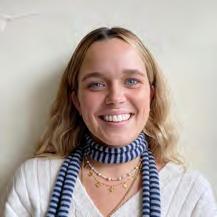

developments following on from the petition, such as the appointment of a VP for Diversity and Continental reps for Africa, South Asia, China and African America on the OKS Committee. These and other proactive changes can really make a difference.
In concluding, let us challenge all of you who live in certainty that you abhor racism, to reflect deeply on how you can actively fight racism in your day to day behaviours and interactions. Many find discussions of this kind uncomfortable. Please know that we in the OKS BAME community continue to encounter denials that there really is a problem here or assertions that the problem is exaggerated. We find this deeply painful.
31 OKS | AuTuMN 2020 OKS FEAtuRE
Above: Camilla Roberts and Jennifer Mbu
OKS Update
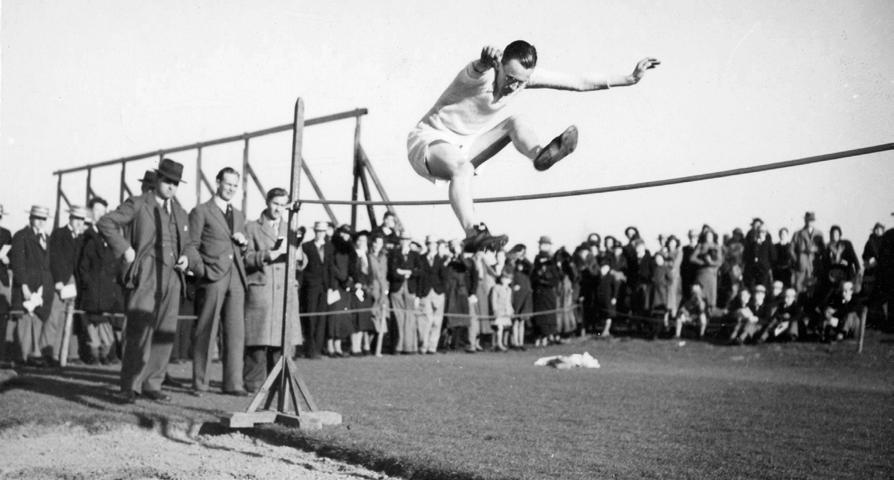
1930s
We are grateful to Piers Evans (GR 1963-68) for sending us some memorabilia of his father’s time at King’s. Dennis Evans (GR 1934-38) kept a diary for 1935 and this has been transcribed by Piers and illustrated with numerous photographs. Entries are brief, but nonetheless of considerable interest – and there is even a list of films seen. The photographs include Monty inspecting the OTC in 1938 as well as many images of athletics.
1940s
John Bradley (WL 1945-48) arrived just as the School returned from Cornwall and remembers the visit of the King and Queen. He found the Reynolds “very welcoming”.
He made a distinguished career in psychiatry, mostly in North London hospitals, from 1953 until he relinquished his licence to practise at the end of 2018. His perspective is probably best described in what he wrote in a digital article for the MedicoLegal Journal in 2017: “There have been radical changes in the delivery of care, from the 2000bed Victorian asylum to community care, and the on the whole beneficial impact of legislation such as Mental Health Acts and Acts dealing with suicide, abortion and sexual offences.” Some treatments have sensibly been dropped, but “a treatment involving passing electric shocks
through the brain has stood the test of time and may be life-saving for some patients.”
Outside of the wards, John was a member of the Parole Board 1992-98, chaired Essex NHS Homicide Enquiries 2003-08, and is still a parttime adviser to the National Counselling Service for Sick Doctors. He and his wife live in London.

David Walsh and Anthony Seldon have published Public Schools and the Second World War, to follow their work on the Great War. King’s gets several mentions, notably in chapter 2 on evacuation and in chapter 9 on the cinema. There are also three School-related photographs: a Scholars’ procession in Cornwall, Rupert Barry at Colditz in his OKS jumper and Montgomery visiting in 1944. In addition to Monty, individual OKS mentioned include: Basil Collier, Alfred Emden, Charles Frend, Jimmy James, Patrick Leigh Fermor, Michael Powell, Carol Reed and Peter Roberts
32 OKS | AuTuMN 2020
1950s
Jeremy Mallinson (MO 1950-54) has sent us a copy of his Les Minquiers: Jersey’s Southern Outpost. This is a major update of his 2011 book. (‘The Minkies’ are an archipelago of reefs and rocky islets between Jersey and Brittany.) “It was an attempt to keep my mind as active as possible” during the lockdown period.
Richard Bates (GR/LN 1951-55) has most generously presented three manuscripts by his father H.E. Bates to the Walpole Collection. The Two Sisters (1926) was his first novel, accepted for publication by the perceptive Edward Garnett for Jonathan Cape. Fair Stood the Wind for France (1944) was a moving wartime story of a Wellington pilot who crash-landed in France and was his first major financial success. A Crown of Wild Myrtle (1962), set on a Greek island, was a later work. Alongside the manuscripts already in the Collection, this makes a remarkable archive illustrating the full range of the writing of this popular local author.
Richard Norton-Taylor (WL 195663) released his entertaining memoir The State of Secrecy: Spies and the media in Britain back in February. The former intelligence reporter joined The Guardian newspaper in 1973 as European correspondent and later security editor and subsequently has many tales to recount from his forty-year career covering the world of spies and their masters in Whitehall. Described by a former senior Intelligence official as a ‘long-term thorn in the side of the intelligence establishment’, Richard has won numerous awards for his journalism.

Above: Two Sisters manuscript
Below: The State of Secrecy cover
happily retired, enjoying (in my case) such various pursuits as cricket umpiring, being secretary in the Old Pupils’ Association, volunteering as an IMB member in the local prison, and last but not least enjoying our four children (Tanya, an A&E consultant, Iain, an economist, Craig, an ECB physiotherapist, and Scott, a budding rugby referee) and six grandchildren. All this keeps us very active as they are spread out throughout the country, so we do a lot of miles. I would love to hear what my fellow Luxmoorians have been up to in recent years. Perhaps this will encourage a reaction! Kindest regards and very best wishes to all of you at King’s, especially in these very difficult times.”
1960s
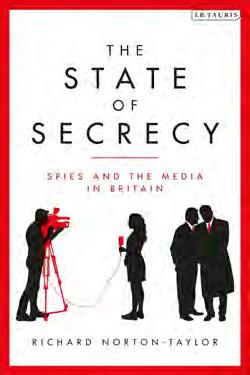
Michael de Weymarn (LX 1959-64) sends us his news. “After 37 wonderful years at Wrekin College which included teaching History and Politics, housemaster, running the cricket, organising the Exchanges and even masterminding Chapel during an ‘interregnum’, my wife and I are now
John Norwood (WL 1960-64) is nearing the end of ‘Project 63’ – his attempt to track down and bring together the rugby XV and VII of 1963/64. “The project was conceived when ‘Twinkle-toes’ Chris Heyland suggested that we do something to recognise the achievements of those years, something I had already been thinking about. I’d like to extend thanks to those who have helped me track down members of the team: Susan Tingle, Deputy Development Director, Peter Henderson, School Archivist, Amanda Young, HSM Walpole House, for showing me how to access Cantuarians online. When all other avenues of contacting Julian Ridley aka ‘The Mighty Quinn’, were failing, enormous thanks are due to Martin Reeson (younger brother to Frank) for taking a day trip and packed lunch into the ‘Hollywood Hills’ around Perth to ‘stir the pot’ amongst the locals and track down our ‘Aussie wingman!’ Richard Heslop also put me in touch with Tony Bragg aka ‘Greased Lightning’ our other wingman. Also remembered is Jenny Jackson who, together with Hugh, when he was still with us, hosted members of the 1963 team for coffee before and supper after the Twickenham VIIs in May each year.” The most recent ‘mini’ reunion of the 1963 team took place in May 2019 so do keep an eye out for further reunions once restrictions are lifted.
33 OKS | AuTuMN 2020
OKS uPDAtE
Opposite page, top: High Jump at King’s
Bottom: Rupert Barry (2nd from left) at Colditz in his OKS jumper
David Miller (Common Room 1962-76) has at last found a review worthy of his scholarship in translating (from the Greek) the ‘Novels’ (corrective ordinances) of the Emperor Justinian, r.527-65. The University of Chicago Press publishes the journal Speculum on behalf of the Medieval Academy of America and its reviewer writes: “These laws are of tremendous importance for the development of Roman law both in the medieval West and the Byzantine East” and that “Miller’s English translation is crisp and very readable (and) at times suitably and imperially florid.”
Adrian Hallam (MO 1966-70) has been acting as church architect for the reordering of St Lawrence Church Eyam in Derbyshire. Eyam famously is the heroic ‘plague village’ which the Revd Mompesson locked down in 1665. Supplies of lead from this area are recorded in a charter of 835 AD as going to Canterbury for the Christ Church (Cathedral) roof.
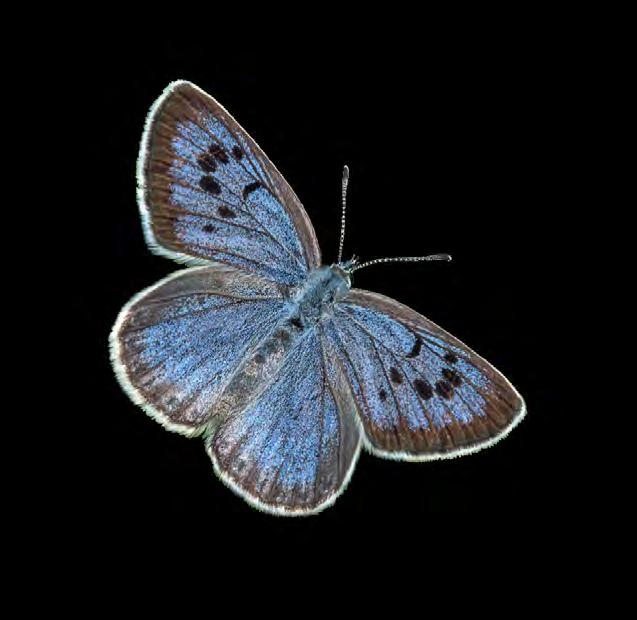
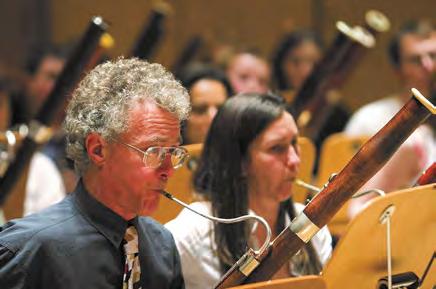
Julian Roberts (GL 1968-72) has recently retired from the position of Principal Bassoon of the BBC Scottish Symphony Orchestra. There is a famously demanding bassoon solo in Shostakovich’s 9th Symphony on which Julian has written in Double Reed News 126, Summer 2020.
Yealand Kalfayan (GR 1969-74) is the photographer for a gorgeous new book, A Kaleidoscope of Butterflies, which celebrates Britain’s 59 species of butterfly in over 230 colour photographs. His pin-sharp photographs were the result of months of tireless searching and stalking.
1970s
Adam Finn (MR 1972-76) is Professor of Paediatrics at Bristol University and lead of the Bristol Children’s Vaccine Centre. His area of research is the impact of vaccination on the transmission of respiratory viruses and bacteria.
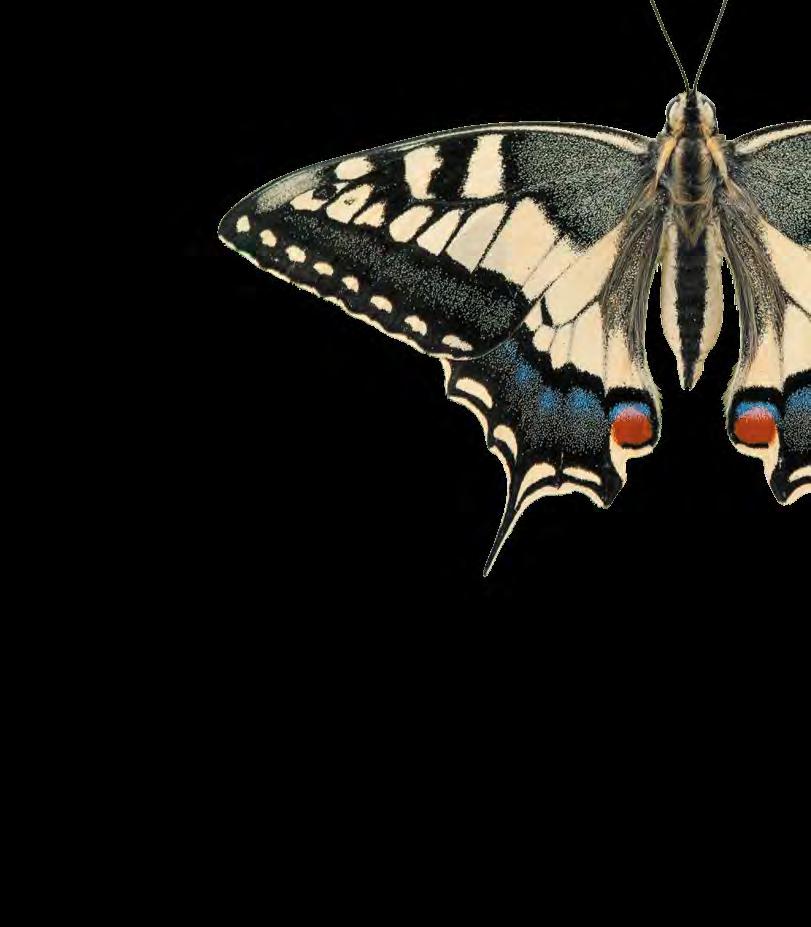
Right: Chris Curl
Above and below: photographs from A Kaleidoscope of Butterflies – top left: Large Blue; top right: Swallowtail; below: Marsh Fritillary
Stewart Ross (Common Room 1974-89) wrote a play for the 2020 Southwold Theatre on the Coast programme until Covid struck. The play Attagirls was commissioned by Matthew Townshend’s (LN 1974-79) MT Productions and is described by Stewart as a “1940s drama with a modern twist”. It celebrates the contribution made by female pilots of the Air Transport Auxiliary during World War II, “but the dangers they face in the skies are matched by the battles they have to fight on the ground”. Luckily the play went online and featured Stewart’s actor daughter Ellie, who was born in School House.
After 16 years as a Headmaster in independent education Chris Curl (MR 1975-80) has started a new business in Christchurch, Dorset with his wife, Emma, formerly a Deputy Head. Chris took a step back from senior management to stay at home as Emma went successfully through breast cancer treatment. The new company ‘Ask The Head’ is offering a range of services for students, aspiring leaders and teachers including but not limited to: coaching, recruitment and online spoken English for international students and business people. He would love to hear from any OKS about their new venture, or just for a social catch-up. www.askthehead.com


34 OKS | AuTuMN 2020
OKS uPDAtE
Left: Julian Roberts
Photo: Double Reed News

Mary Stacey (GL 1976-78) becomes the second female OKS to be appointed a Justice of the High Court.
Mary joins Dame
Frances Judd QC, who also left Galpin’s in 1978 and was appointed a High Court judge in 2019. Mary specialised in employment and discrimination law as a solicitor and received her first experience as a judge in employment tribunals in the late 1990s. “Once I started, I absolutely loved it,” she explained in a video for the Judicial Office in 2017. “It was a luxury not to have to be partisan any longer, and it felt a privilege for people to come before you and want you to adjudicate on their disputes. So I got the bug and I wanted more.” She was later appointed a Circuit Judge in 2014 and a Deputy High Court Judge, sitting in the Queen’s Bench Division in 2018.
Ben Gumpert (SH 1976-81) has been appointed as a South Eastern Circuit Judge based at Woolwich Crown Court. He will be known as His Honour Judge Gumpert QC. He was called to the Bar in 1987 and took Silk in 2014. He was appointed a Recorder in 2009.
Ysenda Maxtone Graham (SH 1978-80) has followed her Terms & Conditions with another engaging and entertaining study entitled British Summer Time Begins. The subtitle is ‘The School Summer Holidays 19301980’ and going away on holiday – for a day or a fortnight – is less her subject than the long stretches of time in which children were left to their own devices. Those who remember these years but may have forgotten the holidays will find their memories jogged in elegantly witty fashion. As the TLS’s reviewer put it: “with a deceptively light touch [the book] took me by the hand, and led me across sunlit lawns towards my childhood”. At least two other School House OKS –Tara Odgers (née Usher, 1984-86) and Tim Amos (1977-81) – are featured and the publishers’ editor is Richard Beswick (SH 1974-78)
Marcus Dalrymple (GR 1979-81) is now based in Harrogate and he and his wife have three sons. He writes, teaches English, and travels strenuously: a recent 50 mile crossing of the North Yorkshire Moors was completed in ten hours, and he has journeyed arduously in distant places with David George (GR 1975-79). His father, John Dalrymple, sometime a chorister and Captain of School in 1944, died in 2005, and his ashes were buried under a tree in the Grange garden.
Roger Taylor (MR/MT 1979-83), Chairman of the exam regulator Ofqual, has had a busy summer. That position is part-time; he also works three days a week at the Centre for Data Ethics and Innovation (CDEI).
1980s
Below: British Summer Time Begins cover

Dr Bill Lloyd Hughes has retired after 32 years of serving the local community and the School with the Cossington House Practice. He became the School Doctor when Dr Henry Byrom retired in 1999. His daughter Emily (CY 2013-15) was ‘parachuted’ into the Crypt Choir on arrival, sang in the Summertime Jazz and the Madrigal choir, and went on to an Honorary Choral Scholarship with the Hallé Choir whilst at Manchester University. She now sings with the Royal Choral Society. He writes: “I have had a fabulous, enjoyable (at times challenging!) and privileged 32 years’ association with the School, its pupils, staff and the Precincts”. In particular, Bill latterly has been working with someone else who has just stood down, Senior Nurse Kate Abbott (née Hunter, GR 1982-84), of whom he writes:
“During my time as MO at King’s I have had the pleasure of working with some inspirational nursing colleagues, none more so than Kate Abbott, who has enabled the Sanatorium to progress through being a medical centre to the current Health Centre in Almonry House. She has been a dedicated professional, totally capable in all circumstances and a wonderful ambassador for the School and role model as a former pupil.”
Kate’s daughter Tilly (BR 2016-18) is in the 3rd year of her Business and Management degree at
35 OKS | AuTuMN 2020
OKS uPDAtE
Durham University. She had to defer her industry placement year at a top hotel in Sri Lanka, but hopes to go next year, in pursuit of a career in hotel management.

Chris Buchholz (GR 1985-90) travelled widely across China as a student before settling in Hong Kong and building a successful private aviation company. Now, with his wife Jenny and daughters Sally and Clara, he lives mostly in the USA but maintains an active aviation career. In his spare time he is an active Mission Pilot in the US Air Force Auxiliary, Civil Air Patrol, and on 29 September he was installed as Squadron Commander, Westchester Hudson Senior Squadron, NY State.
Grant Chum (SH 1989-94) has been appointed the Chief Operating Officer of Sands China Ltd, having been the Company’s Chief of Staff since 2015. Before joining Sands, Grant spent 14 years at UBS Investment Bank and was named Asia’s stock-picker of the year by the FT in 2011.
1990s
Jordan Frieda (SH 1990-91) has a joint share in the rustic Italian restaurant Trullo, in Highbury, and its two casual pasta restaurants, both named Padella. These were employing 150 people. Jay Rayner, Food and Wine correspondent for The Observer, rates them highly: “a fabulous dish of boisterous buttercup-yellow pasta with nutty brown shrimps…”
Natasha Randall (BS, JR 1991-93) has just published her first novel Love Orange – ‘a comic cocktail, an exuberant skewering of contemporary
Left: Chris Bucholtz
anxieties and prejudices’. She is well known as a translator of Russian literature, from Lermontov to Zamyatin, and has now turned to her own time in this tale of the Tinkley family – parents Jenny and Hank, and their sons Jesse and Luke – in the American suburb of Bentonville.
Emily Hague (MR 1994-99) followed University with a PGCE course at Bristol University and went on to teach Chemistry, including at Channing School, Highgate. She is now at the William Booth Training School for two years, preparing to be a minister in the Salvation Army.
Michael Stephens (TR 1996-2001) held an online King’s talk entitled ‘The End of The World’ on 10 June 2020. Michael is the Royal United Services Institute’s Middle East expert. The talk touched on political events unfolding in the USA, the impact of Covid 19 and developments in the Middle East.
Bel Trew (LX 1998-2003), Middle East Correspondent for The Independent, was caught up in the Beirut port explosion. Luckily she was unharmed, though her flat was destroyed, the blast ripping out steel shutters and double glazed windows including the frames. Her Twitter account says; “In all my years of covering wars I have never experienced a blast like this.” Bel was in the mountains at the time and the blast still pushed her to her knees.
Tom Ransley (MR 1999-2004) announced his retirement from rowing in the wake of the postponement of the Tokyo Olympics. He has been a double World Champion as well as an Olympic gold medallist.
2000s
Amit Kaushal (MT 2000-05) married Dr Lenka Piknova in a Hindu wedding ceremony at his family home in Whitfield, Dover on 30 August 2020. They managed to get to Slovakia where Lenka is from to do the civil part of the ceremony. Amit adds, “Our plans of a big Indian wedding in June 2020 at The Savoy London were cancelled so we scaled it back to a more intimate home edition.”
36 OKS | AuTuMN 2020
OKS uPDAtE

Ed Newton-Rex (GL 2001-06) has started a new role as Product Director, Europe at TikTok. During lockdown he joined a panel of Artificial Intelligence (AI) experts to judge Eurovision songs composed by AI systems in response to the cancelling of the song contest. Australia won with their song Beautiful the World, inspired by nature’s recovery from the bushfires.
Alexander Allen (SH 2002-07) joined Peel Hunt in March as an Associate in the Natural Resources Corporate Broking team in London following five years at Hannam & Partners where he focused on corporate finance for the natural resources sector.
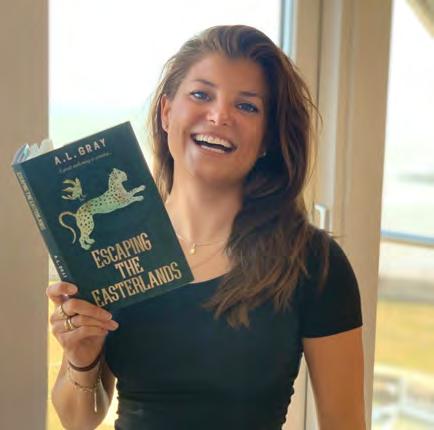
to lots of girls who started walking and running during lockdown and were looking for podcasts to listen to. I personally love hearing from amazing people who can inspire us on to greater success in our own lives. But sometimes I feel that interviews don’t focus on the areas that girls can relate to – and that is my goal with Full of Fire – to ask the right questions so girls can learn from and enjoy listening to these role models.
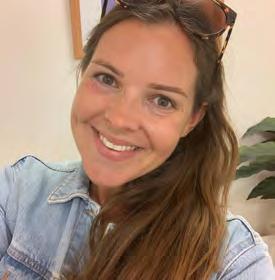
“I’m aware that at King’s I was lucky enough to listen to and be inspired by a range of amazing speakers and teachers. Teachers like Karen Olliver, Sarah Richardson, Cath McDonogh, Jean Watson and especially Susan Wessels were inspirational mentors for me at school. I hope to give girls everywhere the opportunity to hear inspiring voices who are genuinely speaking to them.”
Sarah Eversfield (née Ventress WL 2002-07) has released a podcast aimed at inspiring girls, Full of Fire. Her interviewees include double Olympic gold medallist Lizzy Yarnold OBE and tech entrepreneur Vin Murria OBE. Sarah is an English teacher at Sevenoaks School. “I’ve spoken
Photos, clockwise from top-left: Amit and Lenka; Annabel Gray; Sarah Eversfield
Annabel Gray (MR 2003-08) has always loved being outside, battling the elements. Following King’s she studied Geology at Bristol University and, equipped with her hiking boots and compass clinometer, spent multiple summers mapping both the Greek and Scottish islands. Annabel has just released her first published book, a historical fantasy Escaping the Easterlands: A great reckoning is coming. The plot combines her love of fantasy novels and the great outdoors, as it follows the lives of two mischievous girls on a treacherous adventure.
37 OKS | AuTuMN 2020
OKS uPDAtE

In September this year, Annabel Steadman (née Church, MR 2005-10) secured what is believed to be the world’s largest ever book advance for a debut children’s author.
Skandar and the Unicorn Thief, which is the first book in her fantasy adventure series aimed at children aged 9+, was bought by Simon & Schuster in a multi-publisher auction, and Sony Pictures have also acquired the film rights to bring her magical world – where unicorns are real and deadly – to the big screen. In Annabel’s books, unicorns don’t belong in fairy tales; they belong in nightmares, and can only be tamed by the rider who hatches them.
“I had such inspirational English teachers at King’s”, says Annabel. “Writing is a career that is so filled with doubt – you never know whether someone is going to like what you create. It makes such a difference to have teachers telling you to enter writing competitions or submit to The Cantuarian. And I also had my housemaster, Simon Anderson, and my tutor, Andy Pollock, cheering me on in whatever I turned my hand to. King’s is such a wonderful place for encouraging its students to follow their dreams – I feel so lucky that I got to spend five years there.”
Alice Brady (HH 2006-11) sent us this update on the Zoë Bromfield fundraising campaign ‘Move for Zoë’. “Thanks to the hundreds of people who moved and donated back in August, we have raised just under £45,000 for the ICU at Charing Cross Hospital. We are so honoured to have been able to raise so much in Zoë’s memory and hope that it will make a real difference to the ICU that cared for her. In 2021 the fundraising focus is shifting to Blood Cancer UK and we are looking forward to supporting Olly Bromfield in his marathon swims.”
Rachel Phipps (HH 2006-11) released One Pan Pescatarian in July. It is a cookbook of

100 one pot, one pan vegetarian, vegan and fish based dinners.
Edmund Whitehead (SH 2006-11) recently finished his two years as Jette Parker Young Artist Conductor and Repetiteur at the Royal Opera House, Covent Garden, where he conducted several performances and was assistant to Sir Antonio Pappano. He is back at the Royal Opera in October to conduct HK Grüber’s Frankenstein!! in the UK’s first staged opera performance with indoor audience since March.

Ollie Robinson (MT 2007-10) was rewarded for several impressive seasons with Sussex by being selected for the enlarged ‘behind closed doors’ squad for the Test series against the West Indies. He was then one of the match day thirteen (which became twelve) for the second Test. He was also retained for the Pakistan series.
38 OKS | AuTuMN 2020
OKS uPDAtE

Ferdie Rous (MO 2008-13) wrote about ‘My Canterbury Tale’ in the June issue of The Oldie. He described a return visit to the School and the Cathedral. If his choice of outlet seems unusual for one so young, it is explained by the fact that he is an editorial assistant on the magazine. He also writes on obesity and fat activism.
Stephanie Sy-Quia (LX 2009-13) is a freelance writer and critic specialising in literary criticism and is based in London. Her writing has appeared in The Spectator, FT Weekend Magazine and The TLS and she is a Ledbury Poetry Critic. Her first book is due to be published by Granta.
2010s
A flag designed Alexandra Abadjieva (BR 2011-16) has been selected to appear at the Rockefeller Centre in New York as part of a temporary art installation ‘The Flag Project’ which features a number of flags created by artists across the world.
Photos, clockwise from top-left: Annabel Steadman; Move for Zoë, L-R: Sophie Knight, Phoebe Calcutt, Alice Brady, and Rose Maclachlan on the far right; Edmund Whitehead (photo: Clive Barda); Tatyana Serraino; Alexandra Abadjieva’s flag; One Pan Pescatarian cover
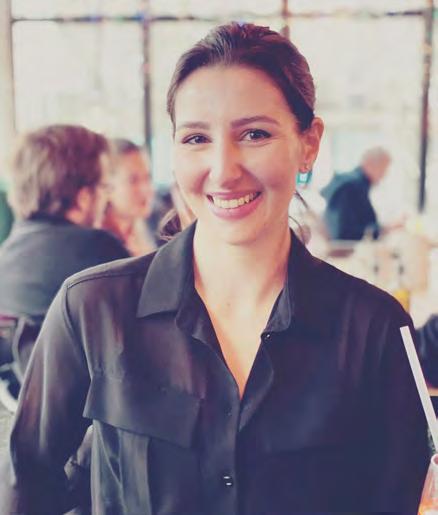
personal aspirations. I was thrilled to hear that my design was one of the ones to be chosen and I still can’t believe that my flag is currently flying in the Rockefeller Plaza!”
Tatyana Serraino (BY 2013-15) has created a YouTube Channel About Art, in which she delivers short fortnightly videos on works of art from all over the world. “My vision is to talk about art in a way that is accessible, fast, and fresh. My love for Art History was fostered at King’s and enhanced while studying History of Art at St John’s College, Cambridge followed by a Masters in Art History at the American University of John Cabot in Rome. Now I want to share my love for the discipline of Art History as widely as possible.”

“Every time I’ve visited New York, I’ve always wanted to return: it’s such a vibrant city that has captured my imagination. So when I heard about ‘The Flag Project’ I knew I wanted to participate. After several designs and redesigns, my final submission is a manifestation of New York City’s vibrant energy, verticality, diversity and my
Jessica Cooling (HH 2014-16) is Orchestra Manager for the London Mozart Players chamber orchestra (LMP). “We had over 40 concerts cancelled during lockdown. As a response we launched ‘At Home with LMP’, daily online content including concerts, child-friendly entertainment (such as Peter and the Wolf narrated by Alexander Armstrong), interviews with stars such as Nicola Benedetti and other musical treats, all to support our musicians and keep in touch with our audience. We amassed over 225,000 social media views. Now we are performing together again in LMP’s ‘Classical Club’, and you can catch both ‘At Home with LMP’ and ‘Classical Club’ via londonmozartplayers.com
39 OKS | AuTuMN 2020
Back to School
Ed Vainker OBE (MR 1994-99) is the Co-Founder of Reach Academy Feltham and was awarded an OBE for services to education in the New Year Honours list for 2020
Throughout the summer, whilst responding to local lock-downs, to contradictory advice on masks and to extended uncertainty about exams, school leaders have had their eye on the start of September and the return to school. For the sake of our young people, their mental health and their long-term futures, as well as for our economy, much depends on leaders’ capacity to get every young person back into school.
In 2012, I set up a new school, Reach Academy Feltham, ten minutes south of Heathrow. We wanted to open a different kind of school – one that ensured that every child left able to live a life of choice and opportunity. We now have 900 pupils aged 2 to 18 and sent our first pupil to Cambridge this October. In 2014 the school was judged Outstanding and in 2017 we were 16th for GCSE results of 6,000 schools. We have also set up the Reach Children’s Hub to support the local community from cradle to career – we run ante-natal classes, support parents into work,
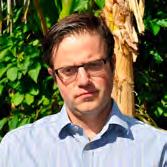
A different kind of school
run youth programmes and parenting support. We’ve been approved to open a second school in Feltham and our curriculum is being used by 130 schools across the country as part of our subscription service.
On Friday 20 March we pulled together a hasty celebration for our GCSE candidates and a farewell to our Year 13s, both of whom had been told the previous day that they would not take their public exams. We handed out 300 laptops, dongles to get some pupils on-line and said goodbye to 60% of students who were still in school and the vast majority of our staff, whom we wouldn’t see for several months.
After leaving King’s in 1999, I studied History and then was part of the first cohort that did Teach First in 2003. I went home from my school in Peckham at the end of my first week and told my Mum that my pupils were just as bright as anyone at King’s, but they weren’t on track for the grades and experiences that we benefited from. I did exactly what the architects of Teach
40 OKS | AuTuMN 2020
OKS FEAtuRE

First hoped for – staying in education. Via two London schools and a fellowship in Montreal I ended up in Washington DC and was inspired by transformative Charter Schools so that when the Free School policy launched I came together with Jon McGoh and Rebecca Cramer to set up a new institution.
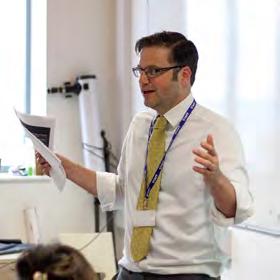
We are proud that since Monday 23 March, the first day of school closure, our pupils have had three or four video lessons to do and had their work marked and returned to them. More than 90% completed their work and that figure remained constant throughout lock-down. The school was open – we had 30 key worker and vulnerable pupils in school. On that Monday we handed out 400 food parcels to families eligible for free school meals and to the local elderly shielding population. That week we made more than a thousand phone calls home.
We sustained that throughout our period of closure. A group of parent volunteers delivered more than 8,000 meals and we handed out more
Main image: Ed Vainker with HRH
The Duchess of Cambridge
Inset: Ed rolls up his sleeves
than 25,000 throughout this period. Our lessons were initially shared on a YouTube channel but after Easter we incubated the Oak National Academy, providing video lessons, with Reach teachers providing more than half the Primary content. The website was used by two million pupils, with 220,000 users every day.
Like King’s, we planned carefully for the return to school in September. We know that 25% of our families are worried about paying for food in the next four weeks, but 40% are concerned about their own or their children’s mental health. We have provided additional support and have sign-posted this to local organisations but know that we are at the beginning of this and will need to continue to listen and be responsive to what is happening in our community. Our school is very different to King’s but we have similar expectations and aspirations for our pupils – that they will go on to live lives of choice and opportunity.
• reachacademy.org.uk
41 OKS | AuTuMN 2020
The Southey brothers: Nephews of the Poet Laureate
In 1830 nelson Castle Southey (born 1820) joined the King’s School. He was the third son of Captain Thomas Southey, RN, and Sarah, daughter of Samuel Castle. He became a King’s Scholar, but left in 1833. He went to British Guiana, where his father was the harbour master, but died there in 1834.
Thomas Castle Southey (born 1824) was the fourth son and the youngest of nine Southey children. He joined King’s in January 1833 and had a very successful school career. He was a King’s Scholar, won numerous prizes, was a regular performer in Speeches from 1838 onwards, became a Monitor and then Captain of School. He won a place at Queen’s College, Oxford, and was awarded an exhibition of £60 p.a. by the Feast Society. When he left in 1843, the Headmaster, George Wallace, paid him a glowing tribute:
“You have been with me upwards of ten years. I taught you hic, hæc, hoc; I have read with you the philosophy of Cicero; I taught you the Greek article; I have read with you the works of Plato,
and the poetry of Pindar. During all this long period, during all this long journey, I never recollect one single instance in which you have drawn down upon yourself a severe rebuke or caused me one moment of serious anxiety. As a monitor, you have been faithful and active in the discharge of your duties, and have rendered the school the most efficient service, not only by the maintenance of discipline, but by your own example conspicuous for good order and gentlemanly bearing. In every form you have done well — on every occasion you have supported the character of your school, and your own position in it.
Of your success let the prize list speak. But all your merit is not there expressed. Go then to the University and exhibit at Queen’s College the same sound qualities as you have shown at the King’s School — the same conformity with discipline — the same cheerfulness in the discharge of duty – the same zeal in the prosecution of study — the same careful walking in the paths of religion, and you will not fail to
42 OKS | AuTuMN 2020
unKnOWn OKS № 25
procure regard and esteem of all who know you. May God in his mercy bless you and preserve you, and in his good time so fit you with learning and grace, that you may become a labourer not unworthy of the holy vineyard of his Church!”
The boys’ father was a younger brother of Robert Southey (1774-1843), the prolific author who became Poet Laureate in 1813. He had served in the Navy during the French Revolutionary and Napoleonic Wars (he was wounded at Copenhagen) and survived a court martial before a spell of farming and then work as a customs officer. He published his Chronological History of the West Indies in 1827. He was a regular subscriber to the Feast Society and gave several books to the new English Library started at the School in 1834. These gifts included his own book and several works by his brother. (It may be, but it is impossible to prove, that the copies of Joan of Arc and Madoc had been given him by Robert.) The School clearly appreciated the connection as extracts from Robert’s works featured on Speech Day in 1833 and 1834.
This picture of Captain Tom needs much qualification. He appears to have been somewhat feckless and his unstable finances meant that he was often reliant on hand-outs from his sometimes exasperated brother. (Robert’s vast correspondence is being published, but has so far only reached 1821. More may emerge about their relationship in due course.) By the 1830s the Southeys were living in the Cathedral Precincts and much of the responsibility for raising the large family seems to have fallen on Sarah Southey, even before her husband died in 1838.
A letter recently acquired by the School sheds some light on this. In April 1833 Sarah wrote to Henry Collingwood Selby, a landowner near Alnwick, thanking him for his cheque for £20. “The relief is most seasonable for it enables me to discharge the most pressing of our demands…” She went on: “I have great blessings in a good Husband and promising Children – and I hope we shall have it in our power to give them the advantages of education – but we are most anxious to instill into their minds sound religious principles.” Three of her children died young, which added to her troubles. In addition to

Nelson, another son Robert Castle Southey had died in 1828 aged 14 and a daughter Eleanor Thomasine died of consumption aged 18 in 1835. Her gravestone is in the cloister garth.
Thomas Castle Southey had a worthy career in the Church. After Queen’s he was ordained and then served at Horncastle in Lincolnshire, at St Mary’s, Montrose, at St Paul’s, Brighton, at St. Thomas the Martyr, Oxford, and at Wendron, Cornwall before becoming Vicar of Newbold Pacey, Worcestershire in 1868. He died there in 1899.
Above:
Sarah Southey’s letter 1833
In 1854 he had returned to Canterbury as the Speech Day Preacher. At the Feast Society dinner he spoke revealingly of his debt to the School. He thanked the Headmaster for “the personal kindness shown him during the ten years he was under his charge… Had it not been for Mr Wallace he could not have continued so long as he had at school; and had it not been for the exhibition of this Society he could not have gone to College at all.” His mother’s hope had been fulfilled.
43 OKS | AuTuMN 2020 unKnOWn OKS № 25
Lives Remembered
Robert Humphry Howie
(LX 1945-49)
Fiona de Bruin has sent this tribute to her father: born 4 August 1931; died 8 April 2020.
It was with great pleasure that I had the opportunity to travel back to King’s with my father in September 2017. It was a trip down memory lane for him and an opportunity to tell me more about his time at Canterbury. He had been living in Jamaica with his parents up until he was one of the first cohorts of pupils to attend the School after the ending of World War Two.
Pupils had been in Cornwall and father joined them when the school buildings reopened in October 1945 and when the physical signs of the local blitz were still very much to be seen. He was placed in Luxmoore which was then a boys’ house. The school my father entered was, as described eloquently in 1995 by Michael Mayne, who had also been in Luxmoore and was then Dean of Westminster: “back to a battered Canterbury, the school buildings scarred by war, the Dining Hall flattened, the Green Court covered with trenches and marred by an underground air-raid shelter. And we came into this Cathedral, all its stained glass removed, but still a charismatic building in the shadow of which the school, whose ethos we now had to rediscover, had stood for centuries.” My father remembered when the stained glass windows were returned – a moment he would never forget.
King’s planted my father’s love and passion for singing and he was a member of the choir throughout his school days. His lust for singing continued to weave a thread throughout his whole life and he has been a member of many choirs in different countries. Singing would be a pastime he would keep up, right until his passing this April.
King’s seemed to wend its way through his life by the people he met and continued to do so, right up to the moment in later life when he made a great golf friend who they later discovered had also received a King’s education. He passed his love of the School on to his grandchildren and
attended an OKS event with one of them just recently. His education enabled my father to have a long working life after military service, with a career in the packaging industry. He first worked in London and, once married, he enjoyed his honeymoon on the cruise liner that took him and his wife Anita to South Africa where his first child Mark Robert was born. On returning to the UK my father was based in Leeds where I was born and then in the West Country where he had his third child Jane Helen, and then finally back to his starting point, Dorset, where he had met his wife. He travelled the world with his job, meeting some wonderful people, and although British to the core he made and maintained friendships with people who had touched his life from all over the world.
My father’s outlook on life, his zest and zeal can be partly put down to those invaluable years spent at King’s.
Philip Creasy OBE
(WL 1945-51)
Richard Creasy (BR 1976-81) sends this tribute to his father.
Philip was born in Littlebourne in 1932. He was a local boy who went far. He joined King’s at the end of the war in 1945 and, as many an old timer from those days will relate, these were difficult times. However, under the firm grip of Canon Shirley the School passed through dark days and thrived. Philip thrived too on the playing field; excelling at rugby, cricket and athletics. He also met his lifelong friend, David Coupe (194551). Both became house monitors in Walpole under the strict eyes of housemaster ‘Piggy’ and Vera Reynolds. David became Philip’s best man and the favour would have been returned but for Philip’s posting to the Far East. Similarly, each became godfathers to their eldest born children. Both David and Philip’s sons followed their father’s footsteps into King’s. Simon Coupe joined Walpole (1973-76) and then Broughton (1976-78) and Richard joined Broughton in 1976.
44 OKS | AuTuMN 2020
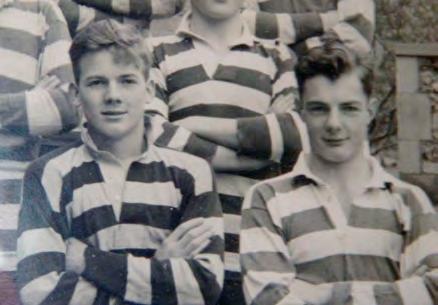
Upon leaving King’s Philip did his national service and became a commissioned officer and, having passed out from Sandhurst, joined the 2nd Battalion 7th Gurkha Rifles (2/7th). There followed an extraordinary life of postings in Hong Kong, Malaya, Singapore, Dharan (Nepal) and Brunei. Trouble was invariably brewing in South East Asia at the time with the Malayan Emergency, the Confrontation in Borneo and the Chinese forces massing on the borders with India and Hong Kong. So Philip was engaged in various jungles or training others in jungle warfare. In 1958 Philip married Jean. Their first child, Sarah-Jane, was born in Kluang and then Richard in Dharan.
Away from the stresses of active duty, a life lived in exotic places provided some idyllic times. In Blakang Mati (now Sentosa) the Battalion had the island and beaches to themselves. In those days you made your own entertainment, even if that did mean Philip dressing up as Santa Claus riding an elephant delivering presents to the children in the camp in Dharan. To his great disappointment, as second in command, the 2/7th were disbanded and so Philip never got a command. However, he made a plan. He joined the Royal Army Pay Corps, gained some qualifications to stand him in good stead for civilian life and after a few more postings left the army as a lieutenant-colonel. Civilian life brought more settled times and the family was able to live in the family home in Canterbury. Philip was able to devote some time to the King’s cause as Secretary and Treasurer of the OKS Bursarship Society.
After working as head of personnel for an
international bank and a Norwegian shipping company, Philip became a member of the Royal Household and as Financial Controller to the Prince and Princess of Wales helped to set up the relatively newly married couple in their households at Kensington and Highgrove. Philip then took the opportunity to lead the Royal British Legion as General Secretary. A moderniser, he led the Legion through some difficult times and put the organisation on a sound financial footing. At the same time he campaigned for those who were less represented than had been the case, such as the war widows. Both he and Jean were proud and humbled to accompany the widows on a couple of visits to the graves of their loved ones abroad. Philip received an OBE for his leadership of the Legion in the first Gulf War and the assistance provided to the troops.
Philip was active in his retirement, as Chairman of the Local Conservative Association during Michael Howard’s tenure as leader of the Tory party in opposition. He also kept up his links with the Hythe branch of the Legion.
He was a loving and devoted husband and to the end his first thoughts were for Jean. He was a caring and supportive father to Sarah-Jane and Richard. He was an adoring and proud grandfather to Jenny and Clare and, latterly, found having two little step-grandchildren running around very entertaining. He was convivial company and had a generous spirit both with his time and his praise. He was a good friend and made a number of cherished long term friendships from school and his army days. He continued with his interests of collecting glass and ceramics and was a keen gardener. We will miss his ready smile, his generous nature and just being there as husband, father, grandfather and friend.
Although Philip had travelled far in his life he was always rooted in East Kent and he passed away from the Covid virus in hospital near to his birthplace. Just before Philip died, Richard was able to attend the Walpole reunion with David and Simon Coupe and visit the new Malthouse Theatre where seat plaques for Philip, David, Simon and Richard now appear side by side.
45 OKS | AuTuMN 2020
LIVES REmEmBERED
Right: Philip Creasy (left) and David Coupe in Colts Rugby team of 1949

Nevill Swanson
(GR 1951-56)
Bill Swanson (LN 1986-91) sends this tribute to his uncle.
Nevill swanson was born on 16th November, 1937 at Bexleyheath, making him a Kentish Man. His mother kept a detailed nursing diary of his nutritional input and, indeed, Nevill was obsessed with what he ingested for most of his life, particularly ale. He was a diligent and intelligent child, earning him the family moniker of “Clever Nevill”; he remained always right even when he was wrong. He attended various prep schools before being sent to board at King’s (The Grange). He took ‘A’ levels early and was offered a place at St. Edmund Hall, Oxford, where he studied Chemistry.
He met the love of his life, Angela, in a pub and they married on 3rd June, 1967. They lived initially in Chiswick and, later, Woodham and
Sunbury and then, for a few years, in Datchet, close to Slough where his (Almet) UK office was based.
He worked for various metal companies and then in 1982, having joined GKN in Kidderminster, relocated to Worcester, which, aside from a year in Cumberland, would remain his home. He made the Lamb & Flag his watering hole, joined its cricket team and went on tours to Wiltshire, Ireland and the Netherlands, generally consuming more pints than he made runs.
His later career saw him working for an American company, Ransom & Randolph.
Having retired from his commitments with the European Investment Casters’ Federation, Nevill realised that he would no longer be afforded travel and hospitality on company expenses so offered his considerable experience and palate to Conde Nast Johansens and became an inspector of luxury hotels and restaurants. He also took up the cause of his great grandfather, Donald Sutherland Swanson, the officer in charge of the infamous “Jack The Ripper” murders.
In February 2020 Nevill’s health went into a steep decline and he agreed to go into a nearby home for respite care. He was not entirely happy with all the staff there, half-jokingly nicknaming one of them Rosa Klebb! There followed an extremely difficult few months for Nevill and his family as they could not visit him. He lost his appetite but did still make requests for beer. When he finally was allowed two visitors, his children went to see him and he could talk with them. He seemed OK until he asked “Where’s Mum?” However, sadly she had died in 2015, and the following day he left to be with her.
Nevill being a dedicated oenophile caused his children James, Duncan and Elizabeth, to consider having a cardboard coffin made from Laithwaites wine boxes.
46 OKS | AuTuMN 2020
Left: Nevill Swanson
Below: Freddy Maplethorp
Frederick (Freddy) Maplethorp
(WL 1951-57)
Freddy was born in St. Raphael, France. His life in the South of France was interrupted by the German occupation but, because his parents both had British passports, they left St. Raphael in June 1940 on the last boat and had a difficult twoweek trip to England via Gibraltar. Once in England, they had hoped to return to France as soon as possible, but they were obliged to stay five years in Sleaford until the end of the end of the Second World War, during which time Freddy became fluent in English while still speaking French with his parents. His return to St. Raphael was brief and by 1946 he was boarding at Junior King’s. He joined the senior school in 1951, starting in the Forrens before moving to Walpole. He was Company Quartermaster Sergeant in the CCF.


Michael Vincent
(MO 1951-57)
On leaving school he did a ‘gap year’ in Port Moody, Canada with his brother Cyril (WL 1940-45) before studying ancient and modern languages at Trinity College, Oxford. Over the years Freddy developed an extensive knowledge of English and French accounting and tax rules.
Freddy was very congenial, a true gentleman and spoke perfect Oxford English. He was also able to correct the French auditors who debased the French language. He retired in 1999 and moved to St Raphael to care for his mother. He enjoyed annual trips walking in the mountains with his parents and then eventually with his niece Amanda and her family. While he enjoyed St Raphael, in 2015 he was very pleased to move to Switzerland and enjoyed five years, making many new friends. Freddy died on 16 March 2020 aged 82.
Mike’s daughter Clare kindly sent us this obituary.
Mike sadly passed away on 19 May 2020 at his home in Christchurch, Dorset. Mike was Captain of School from 1956-1957 and he was only too aware of the advantage that a good education afforded him. He was also a natural sportsman and he developed a love for cricket.
He was an active pupil at King’s and delivered a speech as Head Boy at King’s in 1957 when the Queen Mother opened the Great Hall (later the Shirley Hall). He remembered his school days with fondness.
Mike is remembered by his family and dear friends as an incredibly accomplished man, in sport and in his career with Shell, as well as being a generous, delightful and sociable person.
47 OKS | AuTuMN 2020
Right: Mike Vincent 1st XI Captain
(George) Selby Brock
(SH 1954-59)
Obituary provided by the Old Bradfordian, magazine of Bradford Grammar School.
Selby brock, senior Scholar at King’s and brother to Chris Brock (SH 1959-64), read Modern History with a diploma in Education at Oxford University, leaving in 1963. Selby went on to spend 36 years at Bradford Grammar School teaching maths and history.
Outside the classroom he inspired and encouraged many young athletes, among them Team GB members, to excel in their chosen sports.
His former colleagues spoke of his personal warmth and commitment to BGS running, which saw him build one of the best school running clubs in the country.
Selby’s passion for cross-country remained undimmed, even after he retired in 1997. He could often be seen overseeing a time trial in Lister Park, or on the old school track, and would drive students on Saturdays to fixtures all over England.
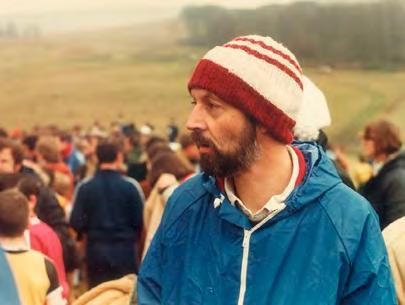
Lord Garel-Jones
(GR 1954-60)
Former Grange Housemaster and Editor Stephen Woodley penned this obituary.
Although he will always be associated with Mrs Thatcher, and with Spain, Tristan Garel-Jones, the son and nephew of OKS, was authentically Welsh. Born near Swansea in 1941, the son of a lawyer who drove a bus during the General Strike, and of a miner’s daughter who became an Eisteddfod winner, Tristan began his education in a village school near Llanelli, speaking only Welsh.
In 1948 the family moved to Madrid because of his mother’s bronchitis, and there his father founded what was to become a very successful language school, La Casa Inglesa. Tristan’s first contact with King’s was when he was about 10 and the family, holidaying in St Sebastian, were visited by Paul Pollak (MO 1941-44, Common Room 1950-88). The two of them made a ‘sandsculpture’ of an almost life-sized crocodile, and were complimented by the Japanese Ambassador to Spain, walking by. The connection well made, Tristan’s father would always bring a bottle of best Spanish brandy (for Paul, not Tristan) once the boy entered Lattergate in 1954.
His colleague Mike McCartney said: “In an era before ‘sport for all’ became commonplace, Selby made running fun, whatever the ability level. He was very much the quintessential, oldstyle schoolmaster who managed to combine his running commitments with a full teaching timetable and duties as a form tutor. I think the word ‘legend’ can be overused, but in the context of schools and what education is all about, I can’t think of a better one when I think of what Selby has achieved and the massive influence he had on so many people. I know he will be sorely missed.”
Selby died on 12 July 2020 at the Bradford Royal Infirmary following a short illness. He was 79.
At King’s, Tristan attracted interest, and stories. The most told is of how he was hoicked out of a minor rugby practice on Blore’s by Canon Shirley and told to go at speed to Birley’s, because he’d be hooking for the 1st XV on Saturday. He did, and went on to represent London Welsh Schoolboys. More choice, and less well-known, is of when Francis Voigt, Grange Housemaster, received a phone call from the Headmaster about 9pm one evening: “Tell Garel-Jones to come to my house now with a packet of his cigarettes. I’ve run out, and would like a smoke.” This may all have been good training for defenestrating Mrs Thatcher thirty years later—or didn’t he? The story is well-known, its evaluation still contested.
Briefly, Tristan married a Spanish landowner’s daughter and they had five children; he expanded the language school’s business; and
48 OKS | AuTuMN 2020
LIVES REmEmBERED
Above: Selby Brock

then in 1970 he returned to England seeking a political career. He joined a merchant bank and worked at Conservative Central Office. At the third attempt he gained a parliamentary seat, capturing Watford from Labour in 1979.
Once in Parliament, Tristan set up a leftish dining club, the Blue Chips, and was appointed to the Whips’ Office in 1982. Though no ‘Thatcherite’ he gained her respect for sorting out problems and became deputy chief whip in 1988, before moving on to be Minister of State in the Foreign Office. When Mrs Thatcher’s leadership was challenged ministers who thought her position had become untenable met at Tristan’s house in Victoria on 20 November 1991, seeking to advise her of this and decide on a successor.
With John Major Prime Minister, Tristan stayed at the Foreign Office as Minister for Europe and played a central role in Major’s negotiation of the Maastricht Treaty, which kept the UK out of the common currency. Once that was narrowly passed through Parliament, he left the Government and became a life peer, with many interests.
Although their children were educated in London day schools, Tristan did keep contact with King’s, coming down to give a Sixth Form lecture on Europe in 1997 and reviewing Jonathan Powell’s book The New Machiavelli for the OKS. He regarded his school contemporary Charles Powell (GL 1955-60), Mrs Thatcher’s closest adviser, and younger brother Jonathan Powell (GL 1969-73), Tony Blair’s adviser, as “the very best of the traditional, high-minded, decent public servants who form the backbone of what makes this country tick.” (OKS Offcuts, May 2011)
Graham Pritchard
(LX 1955-61)
Roger Sutton (WL 1950-56) sent us this memory of Graham who died on 26 October 2019.
Ihad the pleasure of playing cricket and hockey against Graham for the OKS against the School. It was then that I realised that he was one of the greatest all round sportsman to grace the fields of the School. He was in the Rugby 1st XV from 1957 to 1960, Cricket 1st XI 1957 to 1961 and Hockey 1st 1957 to 1961. Furthermore he was Captain of all three. It did not stop there as he was Head of Luxmoore and Captain of School.
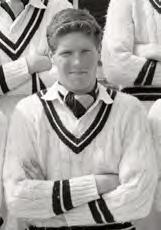
On leaving King’s he went up to Gonville and Caius, Cambridge, gaining a Cricket Blue. He played three matches in 1962, eight in 1963 and was awarded his Blue in 1964, playing in 14 out of the 15 matches and taking 35 wickets at an average of 29.68. His best bowling figures were for Cambridge University against Surrey at the Oval in 1963 when he took 6 for 51. At one stage Surrey were 34 for 5 with Graham claiming all five of the wickets to fall –Bernard Constable, Michael Willett, Peter May, Stewart Storey and Arnold Long. Graham also played six matches for Essex in 1965 and one match in 1966.
49 OKS | AuTuMN 2020
LIVES REmEmBERED
Above: Lord GarelJones
Right: Graham Pritchard, Cricket 1st XI
Chris Gay
(GR 1961-66)
John Revington (SH 1961-66) and Innes Meek (GR 1961-65) compiled this tribute to their friend.
Early in his career at King’s, Chris broke his nose. He was cycling to Birley’s when he came off his bike, just at the point where the concrete path bent round towards the playing fields. His nose stayed out of shape for the rest of his life, but Chris was undaunted. His speech became a bit more nasal, but mainly he just got on with life.
Chris would never claim to have excelled at King’s – that wasn’t what he was about. He played passable rugby, cricket and hockey and a cute game of squash, but for the house, not the school. He was fine academically, but not interested in going to university. In any group, though, he was the one who made things work. As a top fire in hall in The Grange he used to sit at his desk in the corner and exercise benign control over his peers and juniors. He subsequently brought his nice combination of judgment and humour to bear as a house monitor. Ask any of his contemporaries and they will tell you that they remember him with respect and affection. One contemporary recently wrote of Chris, ‘My main ally was Chris Gay, popular and easy-going. We got on because he was affable and relaxed…’ He thoroughly enjoyed his time at King’s, often talking about it, and always kept up to date with events at the School.
His working career started with Barclays Bank DCO in The City before he moved to Metal Box Plc, but he worked mainly for one firm, Ready Mixed Concrete Ltd. He found his natural niche in personnel management, where he climbed steadily up the company ladder, ending up as head of HR.
He married Ann, the beautiful librarian, in 1972, and they had a son, Tom, and a daughter, Joanna. After his retirement in 2003, he and Ann moved from Surrey and bought a house just outside Marlborough to be near Jo, who is a teacher and is married to a housemaster at Marlborough College. Tom is a recruitment

business partner at the Ministry for the Environment in Wellington, New Zealand. Chris will be greatly missed by all his family, which includes five grandchildren, and his wide circle of friends, some of whom go back to King’s days.
Chris was diagnosed with prostate cancer in 2015, an illness that he bore most of the time with characteristic good humour despite many difficult rounds of chemotherapy and radiation therapy.
Chris died at home in the early hours of 24 June 2020. May he rest in peace.
Paul Fullagar
(MR 1964-68)
Paul spent most of his working life in the City or near it. He started by gaining a business degree and then qualified as a chartered management accountant. Paul spent 12 years in the international container shipping business, ending up as group finance director of Ellerman Lines Shipping. He was chairman and principal shareholder of Staffware plc which he built up over 12 years and went on to hold several positions as Chairman at a number of software companies. He became a Freeman of the City of London in 1995 and was due to become Master of the Worshipful Company of Information Technologists in 2020. Paul was a
50 OKS | AuTuMN 2020
LIVES REmEmBERED
Above: Chris Gay at King’s (far left)
DEAtHS
• Richard Dibley (WL 1957-61) on 27 April 2020
• John Hughes (Common Room 2004-08) on 14 July 2020
• Nils Lundgren (LX 1954-57) on 10 February 2020
• Louis Lyttle (MO 2012-17) on 20 April 2020

serial entrepreneur who had over 30 years in the software industry whilst also investing in luxury cinemas and horseracing for nearly 20 years, owning several racehorses.
Paul was also a great philanthropist through his own charitable foundation, donating locally and nationally, including Scan Appeal that became dear to his heart after his first wife Debbie passed away. Paul loved the sport of rugby, ending up playing for the Chiltern Hundreds Veterans. In his spare time, he could be found playing guitar in the local pub. Paul is survived by his wife Amina, four children, a stepdaughter Gabrielle and seven grandchildren.
Keith Plunkett
(SH 1968-72)
Marcus Sephton (GL 1968-73) sent this tribute to his friend.
Born in calcutta on 21 December 1954, Keith died in St Peter’s Hospital, Chertsey, on 21 July 2020 after suffering stoically with ill health for many years. At King’s Keith boarded first at Riversleigh then at School House. He made many lifelong friends, including Chris Reddick (WL 1968-73), Michael Salmony (SH 1969-73), Stephen Ratcliffe (SH 1969-73), Simon Ratcliffe (SH 1971-75), Peter Gerstrom (LIN 1968-
72) and Marcus Sephton (GL 1968-73). He excelled at chemistry, physics and maths and was one of the very few to be awarded a King’s Scholarship while studying at the school. In fact he was something of a polymath with extremely wide interests. His particular passions were science fiction, chess, photography, astronomy and bridge – which he played over the internet with friends throughout his life.
On leaving school Keith went up to St Catherine’s College, Oxford, where he graduated with an MA in Engineering Science. Preoccupied at the time by rock music, he indulged his creative instincts, producing and exchanging sophisticated letter cassettes competitively with his friends which endured beyond his time at Oxford. He was absolutely fascinated by and immersed in science fiction and wrote many of his own sci-fi epics, none intended for publication.
Keith began his career at Marconi Space and Defence systems. A brilliant programmer and problem solver, he could work in pretty much any computer language. He went on to work for a number of different computer and software companies for a variety of industries, including newsprint, veterinary science, farming and professional services. For the last 10 years Keith was working on bespoke extranet, intranet and portal development and time-lapse photography. Keith was immeasurably kind and an influential figure in the lives of his family, colleagues and friends, and had an absolutely phenomenal memory for precise times, dates, places, events and conversations long forgotten by everybody else. He was a very British eccentric, a genius with an endearing naiveté. He will be very greatly missed by his many relatives, his numerous close, lifelong friends and their families, and his fiancée of his last years, Rosemary.
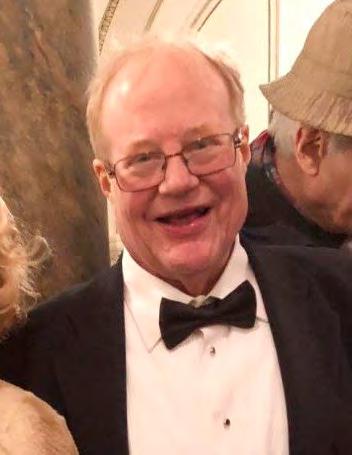
51 OKS | AuTuMN 2020
LIVES REmEmBERED
Left: Paul Fullagar
Right: Keith Plunkett
Sport
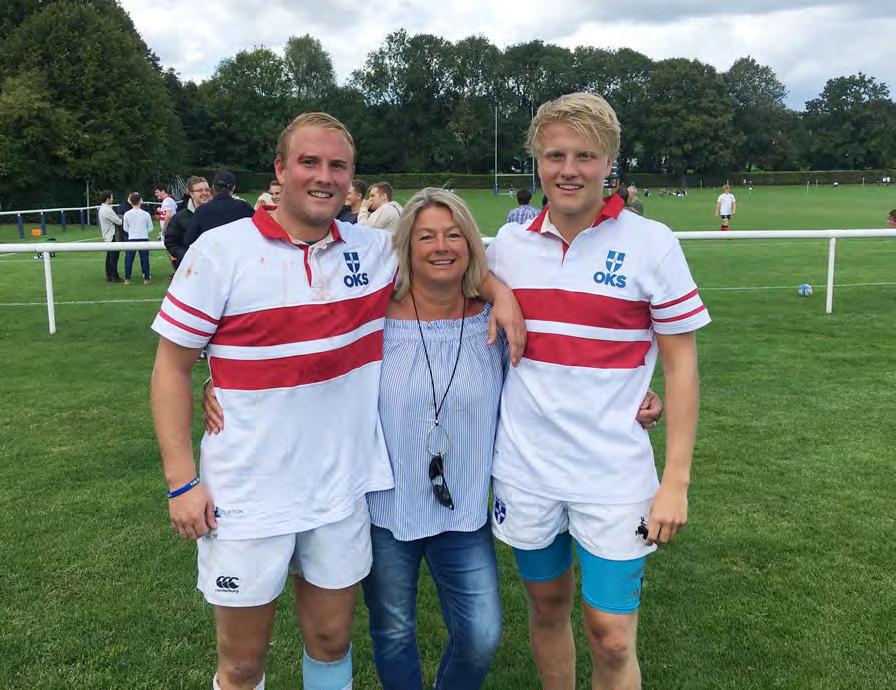
In memory of Dominic Hamlyn
The brothers of the 24-year-old OKS and former 1st team Rugby and Football enthusiast who died at the hands of Sudden Athlete Death are campaigning to save others. Benedict Hamlyn (MT 2011-16) explains.
Following the conclusion of Dominic’s speech at my 21st birthday party, I found myself lodged in the middle of a brothers’ embrace with Gabriel on my right and Dominic on my left. In that very moment I will remember until my dying days, I thought just how wonderful life could be. Little did we know that three hours later our fantastic family of five would be catapulted into a fragile family of four. But I guess that’s the thing about last times, you never know they are the last.
Dominic Joseph Shepherd Hamlyn lived for only
24 years. During his life, Dominic loved, achieved and experienced what many would have been proud to in a whole lifetime. He completed both the London Marathon and 10,000 mile Mongol Rally and raised over £50,000 for charity. He was, and would have continued to be, one of the world’s great contributors. Falling victim to Sudden Athlete Death on the 28th July 2019, sadly that was never to be.
Joining Junior King’s aged 8, having moved down from St Paul’s, London, Dominic went on to become Head Boy. Deciding to move to Mitchinson’s upon ascendance to ‘Big King’s’, he instantly fell in love with the firm, but always loyal and respectful, housemaster Phil Fox – a man Dominic would always hold close to his heart. By the time Dominic left King’s five years later, he had achieved a bristling set of A levels, amassed a wonderful group of loyal friends, and gone on to represent both the 1st XV Rugby and 1st XI Football teams as a full back and goalkeeper respectively. Continuing this trend at University College London he
52 OKS | AuTuMN 2020
Left: Dominic (left) and Gabriel (right) embrace their “mummy-moo” following an OKS Rugby game in 2018
Right: Dominic with Mum and Dad at Cambridge CARDIAC RISK In tHE YOunG Cardiac Risk in the Young (CRY) is a certified charity helping to raise awareness of young sudden cardiac death, including sudden athlete death syndrome, and offers free cardiac screenings to any young person in need.
Please visit and donate to c-r-y.org.uk
received a first-class degree whilst also winning the Jeremy George Varsity Cup against King’s College London under floodlights at the Saracens ground with the UCL 1st XV rugby team. Two weeks prior to his death, Dominic had received his master’s degree from the Judge Business School at Downing College, Cambridge, shortly after helping the Downing 1st XV rugby side claim Cuppers glory for the first time in over 20 years. He was, from start to finish, a true polymath.
Despite his relentless ability to annoy me as only an older brother could, on a card I gave to both Gabriel and Dominic that fateful night of July 27th 2019, I had quoted W.H. Auden and written that they were “my north, south, east, and west. My working week and my Sunday rest”. In truth, that is exactly what Dominic, our big brother, was to Gabriel and me. Dominic was a kind, caring and loving man. His loyalty was greater than any opportunity, and his personality, despite the best efforts of his English teachers, never stayed between the lines. The road since has been and will continue to be long, painful, and lonely. Growing up, Dominic had been our big brother hero and had proved time and again the axiom that “when there is heroism, there will always be hope”. He showed Gabriel and myself that we were and will always be brothers together, but also how to have the strength in our character to stand alone.
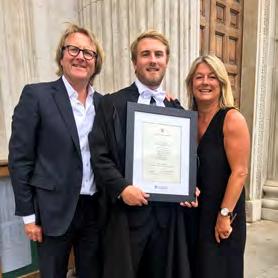
newspapers, including the Telegraph, and had been endorsed by celebrities including actor Kathy Burke, world renowned music producer Fraser T Smith, F1 legend Martin Brundle and Strictly Come Dancing presenter Claudia Winkleman. In total, they say our campaign could have reached up to five million people. Awareness saves lives.
Over a year has passed since Dominic’s death, and my family and I continue to find our new place in the world, knowing full well that life as we once knew it will never return. However, one day – I hope not so long from now – we will emerge as a four, shoulder to shoulder, at peace with the truth that although he will never again be amongst us in person, he will always be with us in spirit. In the meantime I will leave you with the final words of embattled Dutch artist Herman Brood before his untimely death, words which I think Dominic would echo if he were here with us today: “Party on, I’ll be seeing you”.
WHAt IS SuDDEn AtHLEtE DEAtH (SAD)?
On Janurary 16th 2019, the official verdict of Coroner Scott Matthewson ruled Dominic had a pre-existing undiagnosed heart condition, and officially confirmed that Sudden Athlete Death, a rare cardiac condition, had denied Gabriel and me our happy big brother future.
That night, my father began writing a moving piece for the Daily Mail, and Gabriel and I took to Facebook to launch our own SAD awareness campaign. One day we will die, that is nonnegotiable, but with increased awareness about this condition more young lives can go on to see the age of old. Within two weeks, our campaign had been covered by local and national
sad is a heart condition that takes 12 young lives in the UK every week. Many causes are hereditary and easily diagnosable if people at risk have proper checks. The families of SAD victims should be screened by specialist heart doctors. Likewise, the families of any young person who drowned, fell or crashed for no apparent reason as these may mask the real cause, SAD.
The screening involves an ECG (electrical recordings of the heart’s rhythm), echocardiograms (ultrasound examination of the heart), and genetic testing. Unfortunately, treatable warning signs are often missed or ignored. Any young fit person experiencing frequent dizziness, blackout, or faints should alert their GP and pursue immediate screening.
53 OKS | AuTuMN 2020 SPORt
From Kent Live article: tinyurl.com/y2l6txwe
The Pilgrims
The racing season came to an abrupt end with lockdown. It was a great shame for KSCBC, the crews looked promising and the Pilgrims expected a good show at National Schools and Henley. With the early curtailment of school rowing careers we hope the leavers continue rowing at University, we offer access to the Pilgrims Mentoring Scheme via Harry Nichols (GL 2011-16) and we encourage membership of the Pilgrims by contacting Andrew Rudkin (WL 1972-77) (see sidebar for contact details).
There are exciting developments for Henley 2021 with an expansion of the regatta to six days. There will be three new events for women – one for Junior Eights, one for Student Eights and one for Club Eights. The opportunities for KSCBC and Pilgrims abound.
On the 20 year anniversary since Fred Scarlett’s (LN 1988-93) epic win in the eight at the Sydney Olympics we launched the Scarlett Rowing Scholarship. The funding will be in place for applicants from September 2021.
News from the river
Many congratulations to Amanda Thomas (CY 2007-12) who gained selection for Oxford in the Women’s Lightweight Boat Race 2020. Amanda wrote in: “This was the first time that the Lightweight Women’s Boat Race took place on the full 6.8km Tideway course, so it was a historic moment. The Oxford eight gained an early lead and were ahead for the majority of the race, but Cambridge overhauled us and took the eventual victory. The race was full of drama, including blade clashes. We were fortunate to be able to race, since the following day it was announced that the other Boat Races due to happen on 29th March were cancelled.”
The Pilgrims were delighted to hear about the construction of a new umpire’s launch, Boadicea, for Henley Royal Regatta funded by a
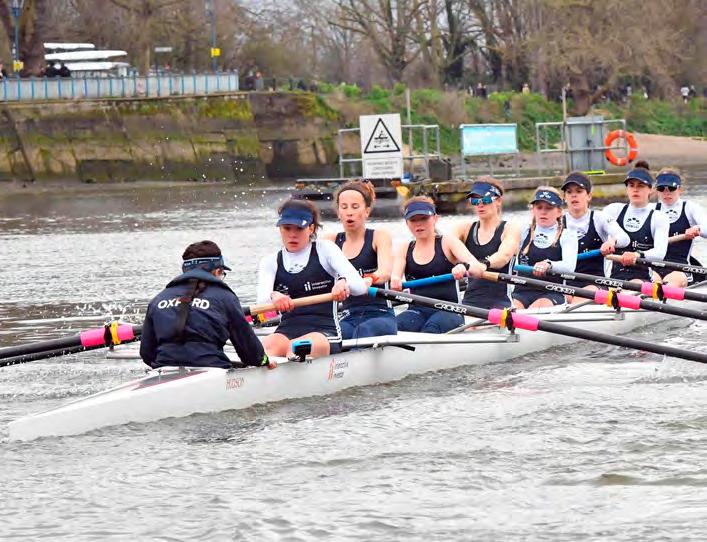

generous legacy from Raymond Butt (Common Room 1968-98). He was an outstanding teacher of physics and accomplished oarsman having twice won the Boston rowing marathon. He thrilled many at King’s with his jocularity, eccentricity and ability to recite pi to 3,500 places. He always had a surprise up his sleeve and this legacy is magnificent!
“Boadicea has been known through history by several versions of her name, but Boadicea was the most widely used at the time of the foundation of Henley Royal Regatta in 1839.
I very much look forward to her maiden appearance at the Regatta in 2021.” — Sir Steve Redgrave, CBE Chairman HRR.
Benjamin Loxton-Edwards (MR 1990-95) Chairman of the Pilgrims
CPBC COntACtS
Benjamin Loxton-Edwards loxtonedwards @hotmail.co.uk
Andrew Rudkin andrew@rudkin.uk
Harry nichols harrynichols25 @gmail.com
Support KSCBC by following on Instagram @ksbc1862 or twitter @KSCBC
54 OKS | AuTuMN 2020
SPORt
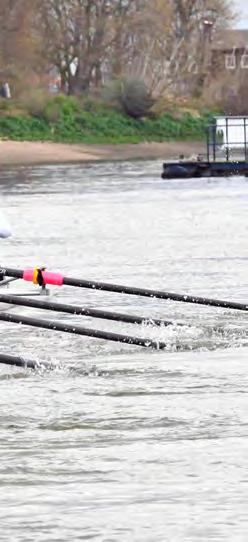
OKS Golf Society –Autumn Meeting 2020
Duncan Cox (MT 1985-90) reflects on the 2020 golfing season.
The oks season has sadly been curtailed with many of the usual fixtures cancelled and no Halford Hewitt this year. However on Friday 11 September, the Autumn Meeting was kindly hosted at Royal St George’s.

score comfortably led the field with Nick and Stephen quietly confident.
In the afternoon, scores improved, in particular the game that saw Tony Amlot paired with Club Captain Jonny Hudsmith playing against Charlie Clouston and Duncan Cox. This was a neck and neck game with Clouston and Cox finishing one point ahead of Amlot and Hudsmith accumulating 44 points from a gross 79 and lifting the Bowls.
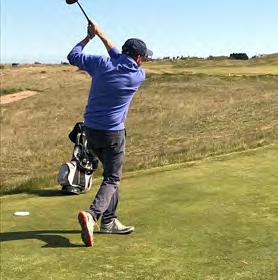
Foursomes was the order of the day, with 36 holes played, split by lunch on the terrace. The morning was dominated by Nick Hunt and Stephen Lark who scored a highly commendable 43 points, which most years would be sufficient to win the Bovenschen Bowls, first played for in 1948. At lunchtime this
Join the Beautiful Game
Oks football is up and running and looking for new members. Since its relaunch in 2017 and subsequent re-entry into the FA officiated Arthurian League (Division 4 South), OKS football has gone from strength to strength. In three seasons we’ve managed promotion, a cup final and, most importantly, incredible memories both on and off the field.
As the club continues its rise up the leagues we’re looking to strengthen our artillery with those who love playing football. We play once a week on Saturdays in South West London and then either toast our success or drown our sorrows in the local watering hole. Either way a wonderful time is had by all.
If you are interested in joining this friendly team for the coming season please contact OKS Sports Rep. James Morpeth (LN 2006-11) email morpeth1@gmail.com or text 07724 578813.
The OKS Golf Society has over 110 members and is open to all OKS, not just those that played golf at school. 20 new members joined in the last 18 months, including leavers from 1980 through to 2018 and with handicaps from 20 down to 5. Please do get in touch if you would like to join the Society and play sociable golf on some great courses including Sandwich, Rye, Huntercombe, Wildernesse and Royal Ashdown.
OKS Rugby
Rugby has always been the beating heart of The King’s School Canterbury and for the last six years or so this cardiac muscle has pumped new life into the OKS sporting calendar. Traditionally we play in the SW London O2 touch rugby league on Wandsworth Common, every Thursday evening from late April up until September. A wonderful opportunity to blow off the cobwebs, get some mileage in one’s legs and then most importantly summarise the game over an American Pale Ale in the Belleville Brewery, handily located merely a stone’s throw from the touch line.
We’d love the younger generation of OKS to come along and get involved and show off their side steps and passing prowess, but most importantly to forge together generations of OKS to march forth and climb up the competitive league table. Please contact freddyclode@hotmail.co.uk / 07920 842293 if you’re interested in playing.
55 OKS | AuTuMN 2020
Above: Amanda Thomas racing in the 5 seat for Oxford University in the Women’s Lightweight Boat Race 2020
Left: Sir Steve Redgrave christens Boadicea
SPORt
Right: Stephen Lark (SH 1980-84) on the 8th Tee

From Blore’s to Basel
Sean-Mun Liang (GR 1977-79) reflects on tennis, ice hockey and a career in seven different countries.
After being plucked from relative obscurity by Stephen Woodley to represent King’s, I discovered competitive tennis in 1979. Over the next few decades, I continued to play, on grass, clay, cement and carpet: for Queens’ College, Cambridge and local teams in Switzerland in the 80s; a club team in Singapore in the 00s; and a club team in Sweden in the 10s. Along the way, I won several team titles as well as a few individual championships, most recently becoming champion at ‘Roger Federer’s club’ in Basel in the veterans’ category (55+) last year.
At Cambridge, I took up the sport most expected of me as a Canadian: ice hockey. A little-known fact is that the teams at Oxford and Cambridge are the oldest in Europe, and their Varsity matches started in 1885. I’m a fast skater and progressed to captain the team in 1982-83. That year saw Cambridge winning the British league (in a lower division), tying against Oxford. My record includes one win, one tie, and one loss against Oxford. Today, the Oxford and Cambridge ice hockey rivalry is still going strong. In March 2018, the two teams met in St. Moritz, Switzerland, for the 100th Varsity match, in the very same place as the first Varsity match in 1885. Featuring both the Varsity match and an alumni match, I drummed up eight players from my era to join – and we won! With a new ice rink now finally built in Cambridge, they expect to dominate Oxford for years to come.

In between these various sports, I’ve had an eclectic career. After graduating from Cambridge with an engineering degree, I worked for a number of start-ups before spending a quarter century at Tetra Pak, the Swedish packaging giant. I’ve lived, so far, in seven different countries on three different continents, and am currently working at a healthcare company based


Sean-Mun at ‘Roger Federer’s club’ in Basel
Inset: Sean-Mun playing the 100th Blues ice hockey match at St Moritz
Photo © Brian Omotani
in Basel. I do partake in other sports, but after a spectacular accident in an aborted attempt at the world’s longest downhill ski race (The Inferno), I decided to give up any pretentions to racing.
Growing up in Canada, with my parents’ roots in Switzerland and China, it is perhaps fitting that my wife Christel comes from a very different place – Finland. We have three children, Emma, Sonia, and Max, who are all in their 20s. They all did their undergraduate degrees at Canadian universities, and Sonia came to the UK for a Masters at LSE. There’s no doubt that playing these sports has not only opened many doors but has allowed me to meet countless new and fascinating people across the world.
OKS mAGAZInE • № 6 • AUTUMN 2020 OKS Magazine is published twice a year by The OKS Association, 1 Mint Yard, Canterbury, CT1 2EZ oks.org.uk Printed in the UK on a PEFC paper stock SPORt



 Stephen Woodley
Stephen Woodley
 David Peters
David Peters
















 A KInG’S EDuCAtIOn IS tRAnSFORmAtIOnAL
A KInG’S EDuCAtIOn IS tRAnSFORmAtIOnAL






 umAR SHARIFF (MT
umAR SHARIFF (MT





















































































